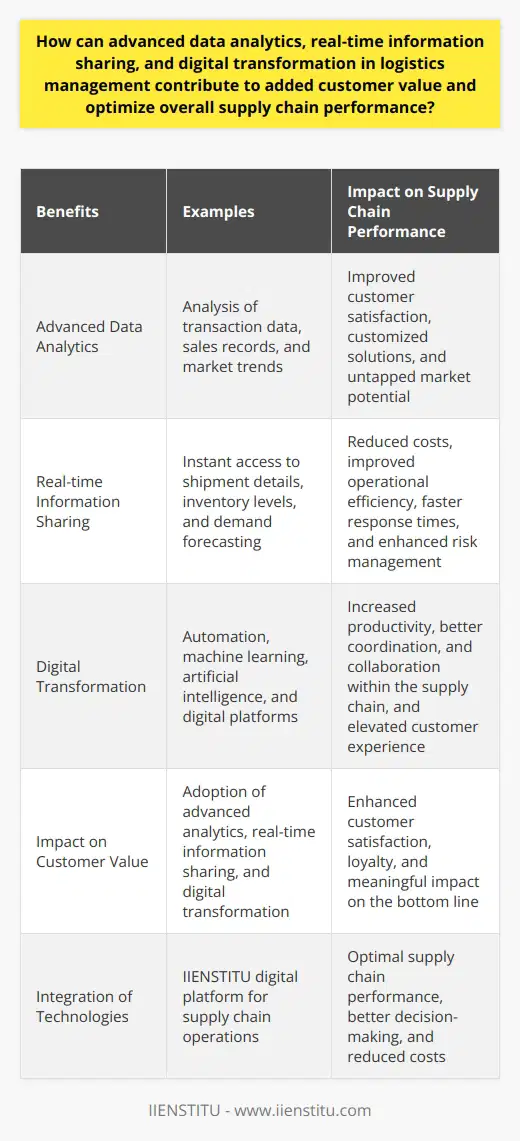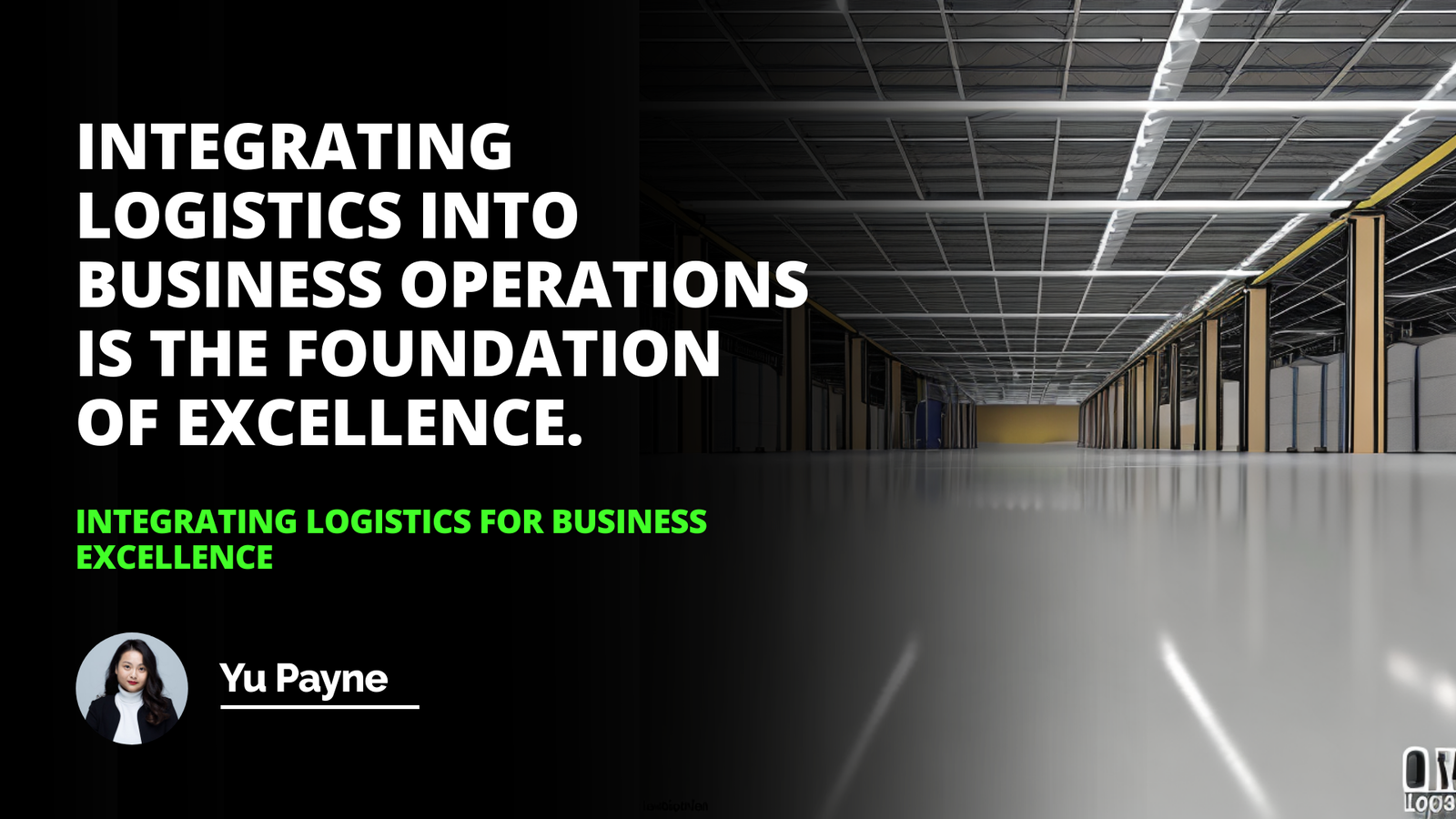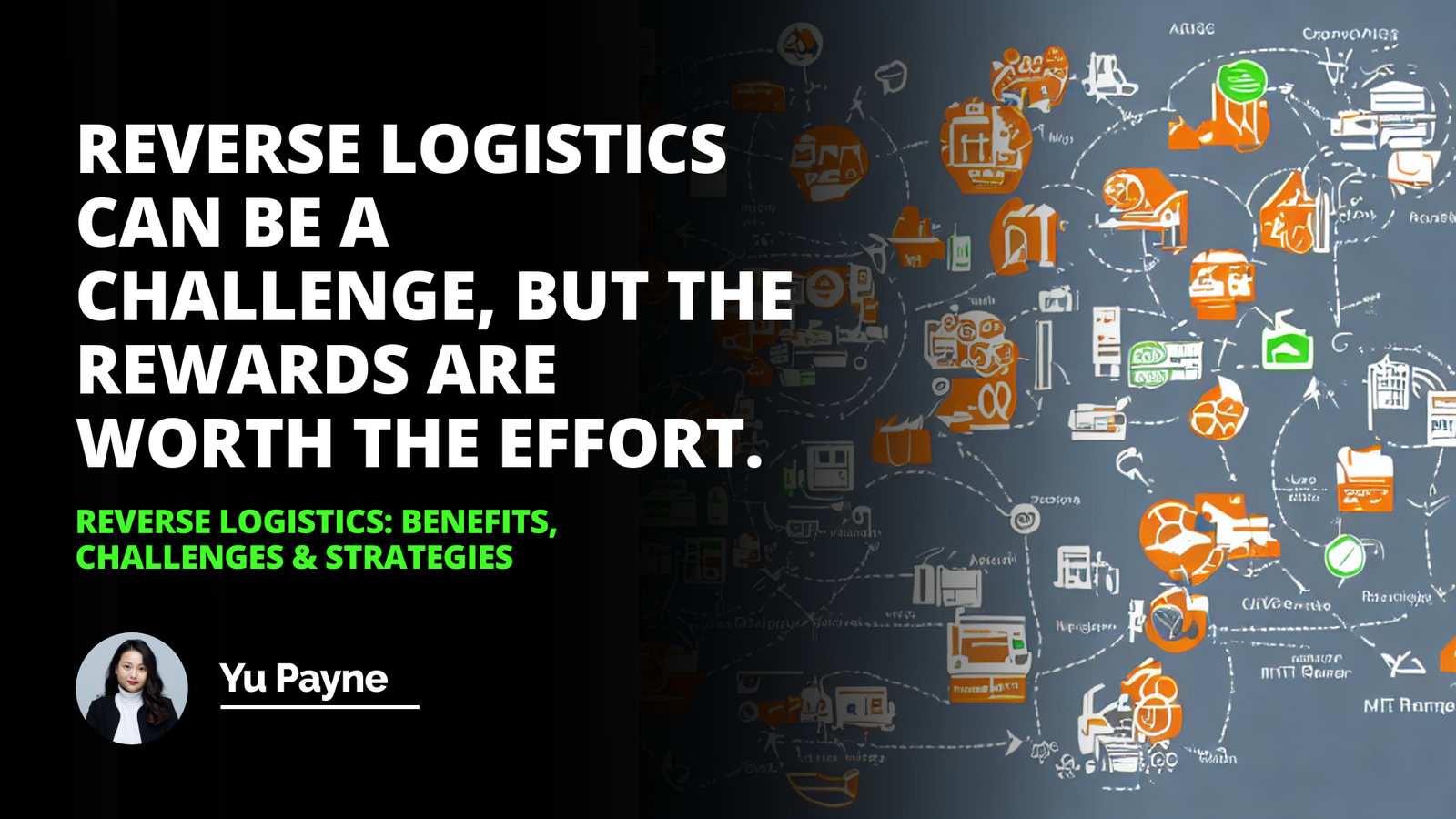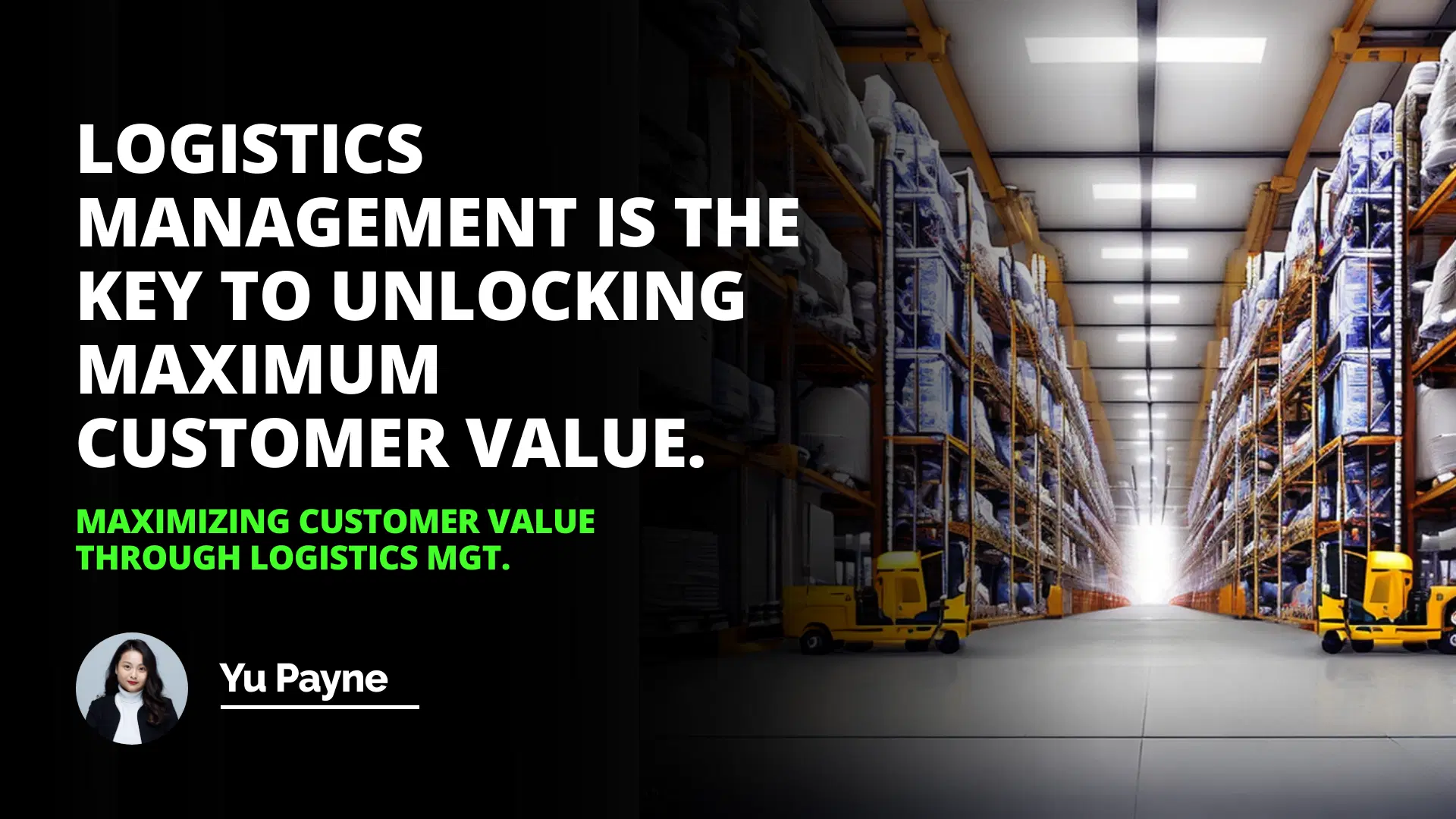
I still remember the day when I was standing in that bustling warehouse in Shanghai, watching pallets of electronics being loaded onto a massive cargo ship bound for Europe. The air was thick with the sounds of forklifts beeping, workers shouting in Mandarin, and the hum of machinery. It was a whirlwind of activity, and yet, amidst all that chaos, there was an underlying sense of precision and coordination. It struck me then how intricate and vital logistics truly is in today's globalized world. I mean, who would've thought that logistics meaning could go beyond just moving boxes from point A to point B? It's about connecting the world, ensuring that the products we need are available when and where we need them.
As I walked through the warehouse, I couldn't help but marvel at the sheer scale of operations. There were electronics from Japan, textiles from India, and spices from Southeast Asia, all converging in this one spot before making their journey to distant markets. It was then that I realized that logistics isn't just about transportation; it's about people, relationships, and synchronization. The supply chain management that orchestrated all of this was like a complex symphony, with each player knowing their part to perfection.
Introduction
Globalization and its Impact on Logistics
Supply Chain Management
Outsourcing of Non-Core Functional Areas
Maximizing Customer Value Through Logistics Management
The New Era of Global Business
With borders blurring and markets expanding, businesses today are no longer confined to their local markets. Globalization has transformed the way we operate, and one of the biggest game-changers has been the evolution of supply and chain management. Back in the day, managing a supply chain was a straightforward task. You had your suppliers, your production line, and your customers, all within a relatively small geographic area. Now, it's a complex web that requires meticulous coordination and optimization.
I recall working with a startup that was designing eco-friendly smartphones. They sourced their screens from South Korea, their processors from Taiwan, and assembled the final product in Vietnam. Managing such a diverse and widespread network was no small feat. We had to optimize the supply chain management process, identifying bottlenecks, and ensuring timely deliveries. It became evident that without an effective supply chain mgmt strategy, even the most innovative products could fail to reach their potential.
A Personal Experience with Supply Chain Challenges
A few years ago, I met Julia, a passionate entrepreneur who crafted handmade jewelry using sustainable materials. She started her business locally but soon began receiving orders from overseas. Excited by the prospect of global reach, she dived headfirst into international shipping. However, she quickly faced numerous challenges in getting her products delivered on time. Shipments were delayed, costs were skyrocketing, and customer complaints were piling up.
We sat down over coffee one afternoon, and I offered to help her look at her entire supply and chain management process. Together, we mapped out her supply chain activities, from sourcing materials to final delivery. We identified that her biggest bottleneck was in customs clearance and inadequate packaging that didn't meet international standards. By tweaking these processes, implementing better packaging solutions, and choosing more reliable shipping partners, she not only reduced delays but also cut costs significantly.
Julia's story is a testament to how crucial scm management is for businesses, regardless of their size. By paying attention to the details and understanding the broader picture, companies can enhance efficiency and customer satisfaction.
Understanding Supply Chain Management (SCM)
Let me break it down a bit. SCM supply chain management isn't just a fancy term. At its core, it's about overseeing the flow of goods and services. This includes everything from sourcing raw materials to delivering the final product to the customer. Effective supply chain mgmt can be the difference between a thriving business and one that's just scraping by.
Imagine a chain with multiple links. Each link represents a stage in the process: procurement, manufacturing, logistics, and so on. If one link is weak or breaks, the entire chain fails. That's why understanding and strengthening each component is vital.
The Components of SCM
1- Procurement: Sourcing and purchasing raw materials.
Logistics management is the key to unlocking maximum customer value.
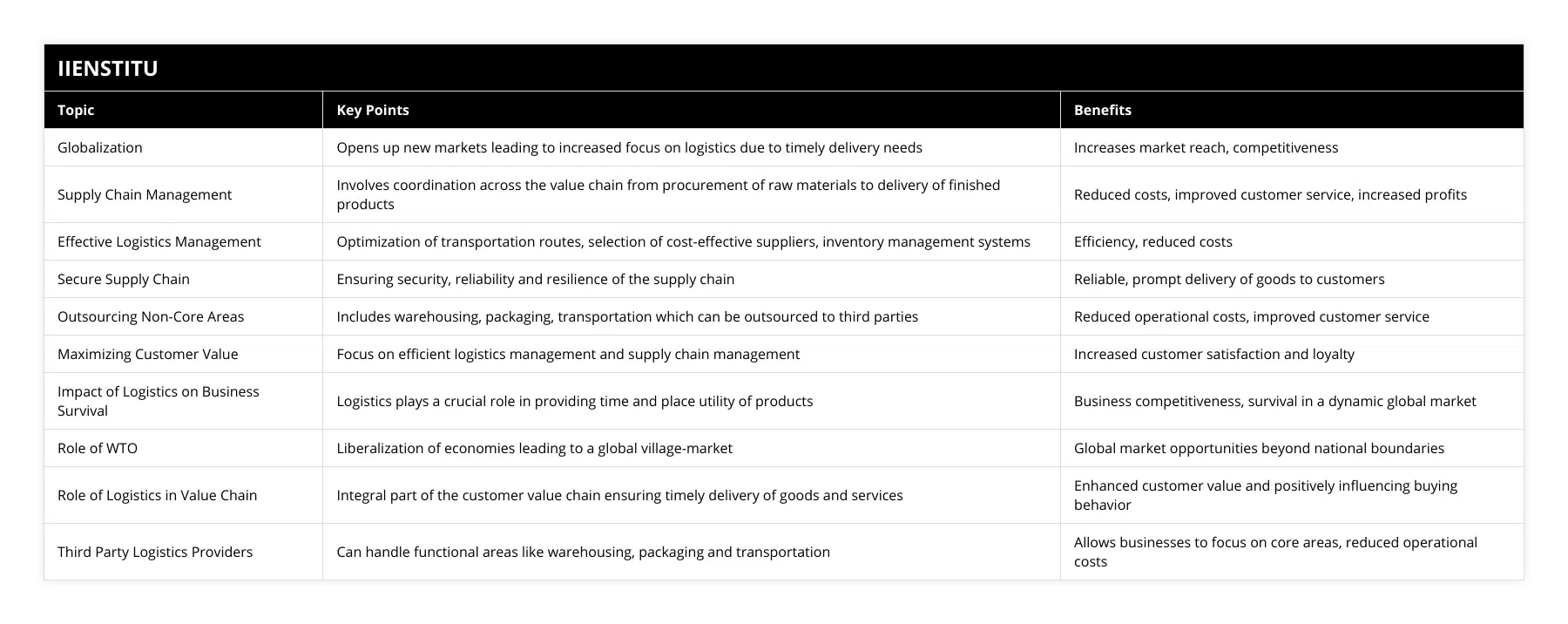
2- Manufacturing: Turning raw materials into finished products.
3- Logistics: Storing and moving goods to where they're needed.
4- Information Systems: Using technology to track and manage the process.
5- Customer Service: Ensuring the end customer is satisfied.
Each of these components is like a cog in a well-oiled machine. If one fails, the entire system can grind to a halt. Let me give you an example.
When I was consulting for a major apparel company, they faced significant delays in production because of issues with fabric suppliers. Their procurement team hadn't diversified their supplier base, and when one supplier faced a strike, it halted production. By reevaluating their supply chain, diversifying suppliers, and improving communication channels, we helped them mitigate future risks.
The Role of Technology in SCM
In today's digital age, technology plays a pivotal role in electronic supply chain management. Implementing robust information systems can:
Enhance visibility across the supply chain.
Improve communication between suppliers and customers.
Streamline operations, reducing errors and delays.
I recall working with a pharmaceutical company that digitized their entire SCM management process. Prior to this, they relied heavily on manual processes, which led to errors and inefficiencies. By adopting an integrated software solution, they could track shipments in real-time, manage inventory levels efficiently, and respond swiftly to market demands. The transformation was incredible. Not only did they reduce paperwork, but they also saw a 20% increase in efficiency. That's nothing to sneeze at!
Outsourcing: A Smart Move?
Now, let's talk about outsourcing. I get it; handing over parts of your business to someone else can be daunting. But hear me out. Focusing on your core competencies while outsourcing non-core functional areas can be a game-changer. For instance:
Warehousing: Instead of maintaining your own warehouse, you can use third-party providers.
Transportation: Outsourcing shipping to logistics experts can improve efficiency.
Packaging: Specialized companies can offer cost-effective and innovative packaging solutions.
By doing this, companies can tap into the most effective HR staff ratios best practices without the overhead of maintaining large in-house teams.
When I worked with a mid-sized electronics firm, they struggled with high overhead costs due to maintaining their own fleet for deliveries. After analyzing their expenses, we recommended outsourcing their transportation needs to a reputable logistics company. This not only reduced their costs but also improved delivery times and customer satisfaction.
Benefits of Outsourcing in SCM
Cost Savings: Reduce operational costs and capital expenditures.
Expertise Access: Leverage the expertise of specialized firms.
Scalability: Easily scale operations up or down based on demand.
Focus on Core Activities: Allocate more resources to areas that directly impact competitiveness and profitability.
However, it's essential to choose the right partners and maintain strong communication channels to ensure alignment with your business goals.
Electronic Supply Chain Management
We're living in a digital age, and electronic supply chain management is no longer optional—it's essential. Implementing electronic systems can:
Enhance visibility across the supply chain.
Improve communication between suppliers and customers.
Streamline operations, reducing errors and delays.
I recently attended a seminar where a leading beverage company showcased how they used blockchain technology in their supply chain. By doing so, they could track each ingredient from source to the final product, ensuring transparency and quality control. This not only boosted their brand image but also built trust with consumers who valued traceability.
Embracing Technology for a Competitive Edge
Adopting technologies like:
Internet of Things (IoT): For real-time tracking of goods.
Artificial Intelligence (AI): For demand forecasting and inventory management.
Blockchain: For secure and transparent transactions.
These innovations can give businesses a competitive edge in the market.
Departments That Make It Happen
Behind every successful supply chain are dedicated supply chain departments handling various tasks:
Planning
Forecasting demand and ensuring supply meets it.
Inventory management to prevent shortages or overstocking.
Sourcing
Finding the right suppliers and negotiating contracts.
Assessing supplier performance and compliance with standards.
Production
Managing manufacturing processes for efficiency and quality.
Implementing lean practices to reduce waste.
Delivery
Coordinating logistics and distribution to ensure timely deliveries.
Handling customs and regulatory compliance for international shipments.
Returns
Managing product returns efficiently to maintain customer satisfaction.
Analyzing return data to improve product quality and processes.
Each department plays a crucial role in supply chain management management (yes, it's a bit of a mouthful), ensuring that everything runs smoothly.
The Importance of Interdepartmental Collaboration
In my time working with various organizations, I've noticed that silos within departments can hinder overall performance. Encouraging collaboration and open communication between departments can lead to:
Improved problem-solving as diverse perspectives are considered.
Greater innovation through shared ideas.
Increased efficiency by avoiding duplicated efforts.
I once facilitated a workshop for a company where the logistics and procurement teams rarely interacted. By bringing them together, we uncovered overlapping tasks and misaligned goals. After aligning their objectives, they achieved a 15% reduction in lead times.
Maximizing Customer Value Through Logistics
At the end of the day, it's all about the customer. Efficient supply chain processes lead to:
Faster delivery times.
Better product availability.
Improved customer satisfaction.
I remember ordering a custom guitar from a company overseas. I was amazed at how quickly it arrived and how I could track its journey every step of the way. That's the power of effective logistics!
Logistics management is the key to unlocking maximum customer value.
Strategies to Enhance Customer Value
1- Implement Just-In-Time (JIT) Inventory: Reduces holding costs and ensures fresh stock.
2- Use Data Analytics: Understand customer preferences and adjust supply chain accordingly.
3- Enhance Transparency: Provide customers with real-time tracking information.
4- Customize Delivery Options: Offer expedited shipping or pickup points to meet customer needs.
5- Maintain Quality Control: Ensure products meet quality standards to reduce returns and complaints.
By focusing on these strategies, businesses can not only meet but exceed customer expectations.
The Human Touch in SCM
While technology is vital, we can't overlook the human element. Building relationships with suppliers, understanding cultural nuances, and having a dedicated team can make all the difference.
Communication
Regular updates and open lines of communication prevent misunderstandings. For example, during the pandemic, supply chains worldwide were disrupted. Companies that maintained strong relationships with their suppliers could navigate these challenges more effectively by collaborating on solutions.
Training
Investing in staff ensures they're up-to-date with the latest practices. Supply chain mgmt is a dynamic field, and continuous learning is essential.
I recall mentoring a young professional named Carlos, who was passionate about logistics but lacked formal training. By enrolling him in certification courses and providing hands-on experience, he quickly became one of the most valuable members of the team.
Adaptability
Being able to pivot when challenges arise is crucial. Whether it's a natural disaster affecting shipments or sudden changes in market demand, flexibility can save the day.
In my experience, companies that value their people as much as their processes tend to have the most resilient scm supply chains.
Conclusion
Navigating the complexities of modern logistics and supply chain management can seem overwhelming, but it's also incredibly rewarding. By focusing on efficient logistics management, outsourcing wisely, embracing technology, and valuing the human element, businesses can thrive in the global market.
So next time you're enjoying a product from halfway across the world, take a moment to appreciate the intricate dance of logistics that made it possible. After all, logistics isn't just about moving goods; it's about connecting people, markets, and opportunities.
By understanding and optimizing your supply chain, you not only enhance your business operations but also deliver greater value to your customers. Remember, a well-managed supply chain is the backbone of any successful enterprise.
References
1- Chopra, S., & Meindl, P. (2016). Supply Chain Management: Strategy, Planning, and Operation. Pearson Education.
2- Coyle, J. J., Langley, C. J., Novack, R. A., & Gibson, B. J. (2016). Supply Chain Management: A Logistics Perspective. Cengage Learning.
3- Christopher, M. (2016). Logistics & Supply Chain Management. Pearson UK.
4- Bowersox, D. J., Closs, D. J., & Cooper, M. B. (2010). Supply Chain Logistics Management. McGraw-Hill.
5- Simchi-Levi, D., Kaminsky, P., & Simchi-Levi, E. (2008). Designing and Managing the Supply Chain: Concepts, Strategies and Case Studies. McGraw-Hill.
6- Mentzer, J. T. (2001). Supply Chain Management. Sage Publications.
7- Harrison, A., & van Hoek, R. (2011). Logistics Management and Strategy. Pearson Education.
Frequently Asked Questions
What strategies can be employed to maximize customer value through logistics management?
Logistics management plays a crucial role in maximizing customer value. Logistics managers must be well-versed in the various techniques, strategies, and tools available to help them create value for their customers. This article will discuss some key strategies that can be employed to maximize customer value through logistics management.
The first strategy is to focus on customer service. Logistics managers should strive to provide timely, reliable, and cost-effective customer service. This means ensuring that customer orders are fulfilled quickly, accurately, and with minimal errors. Logistics managers should also ensure that customer complaints are handled quickly and efficiently and that customers are kept informed about the status of their orders.
Another strategy to maximize customer value through logistics management is to optimize inventory levels. Logistics managers should ensure that inventory levels are kept at optimal levels to meet customers' needs promptly. This can be achieved through the use of software solutions that allow for real-time monitoring of inventory levels. Additionally, predictive analytics can anticipate customer demand and adjust inventory levels accordingly.
Thirdly, logistics managers should aim to reduce costs associated with logistics operations. This can be achieved through the use of efficient transportation routes, the adoption of efficient warehousing strategies, and the implementation of effective packaging strategies. Additionally, the use of technology can help streamline operations and reduce costs, such as through the use of automated systems and robots.
Finally, logistics managers should strive to create personalized customer experiences. This can be achieved through the use of customer relationship management systems, which enable the storing and tracking of customer data. This data can then be used to create personalized experiences for customers through targeted marketing and product recommendations. Additionally, logistics managers can use customer feedback to improve their services and create a better customer experience.
Logistics managers can maximize customer value and create a better overall customer experience by implementing these strategies. This will help build customer loyalty and trust, increasing sales and customer satisfaction.
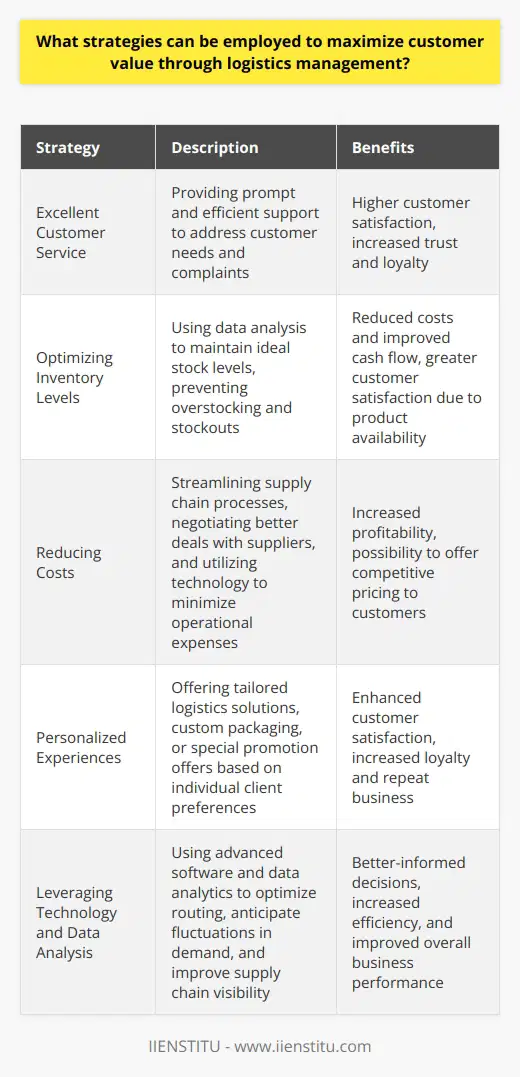
How does globalization impact the logistics management process?
Globalization has had a tremendous impact on the logistics management process. Logistics management is managing the flow of goods, services, and information. It is the cornerstone of global business operations and is essential for companies to remain competitive in today's global marketplace.
Globalization has increased the speed and complexity of the logistics management process. With the increasing global competition, companies must move goods and services quickly and efficiently to remain competitive. In addition, with the vast array of international transportation options, companies must comprehensively understand the process to ensure that goods are delivered on time and within budget.
Globalization has also increased the demand for logistics managers. As companies look to expand their operations into new markets, they need experienced logistics managers who understand the complexities of international trade. Logistics managers must be knowledgeable in all aspects of the process, from import and export regulations to shipping and transportation. They must also be able to analyze data and make informed decisions based on the available information.
Globalization has also impacted the way logistics managers approach their job. With the increased speed and complexity of the process, they must be able to assess the situation and make decisions on the fly quickly. In addition, they must use technology to their advantage, using tools such as tracking systems and digital mapping to ensure that goods are delivered on time.
Finally, globalization has changed how logistics managers interact with their customers. With the increased competition, customers expect efficient delivery and personalized service. This means that logistics managers must be able to build relationships with their customers, understand their needs and provide solutions that meet those needs.
In conclusion, globalization has had a significant impact on logistics management. Companies must have a comprehensive understanding of the process and be able to adapt quickly to changing customer needs to remain competitive. To be successful, logistics managers must also be experienced and knowledgeable in all aspects of the process, from import and export regulations to customer service.
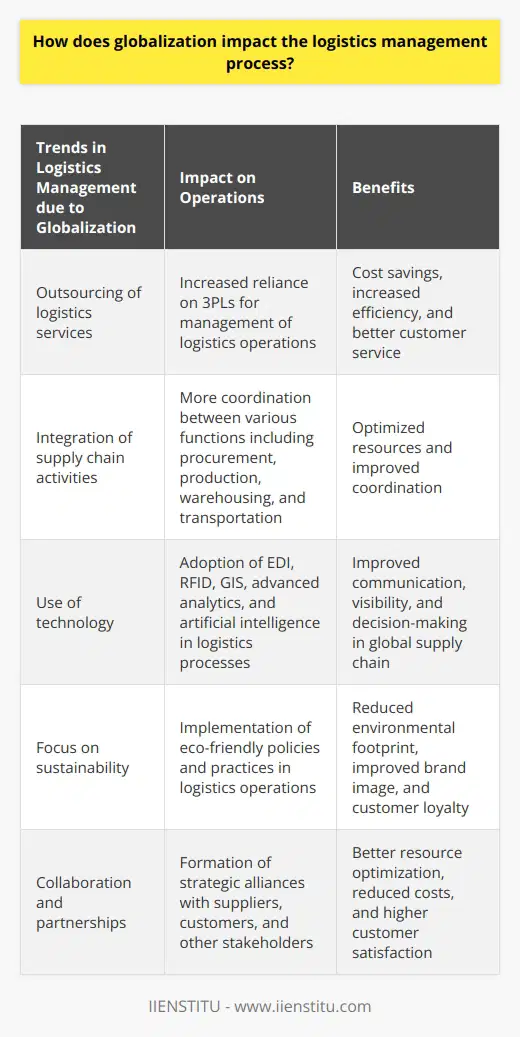
What are the advantages and disadvantages of outsourcing non-core functional areas in logistics management?
Outsourcing non-core functional areas in logistics management can be a beneficial solution for many organizations. By outsourcing, organizations can save costs, have access to expertise, and free up resources to focus on core goals. However, outsourcing has certain drawbacks, such as a lack of control, potential loss of data, and lack of responsiveness.
The primary advantage of outsourcing non-core functional areas in logistics management is cost savings. By outsourcing, companies can reduce labor costs and eliminate the need to invest in additional infrastructure and technology. Additionally, outsourcing firms typically offer more expertise than an in-house team, which can help increase efficiency and reduce mistakes. Finally, outsourcing can also havailfree up resources, allowing organizations to focus on their core goals and objectives.
On the other hand, there are some disadvantages to outsourcing non-core functional areas in logistics management. The most significant drawback is organizations' lack of control over their operations. Outsourcing firms can make decisions without consulting the organization and may not share the same goals or values. Furthermore, outsourcing may also lead to a potential loss of data, as the organization may not have access to the same data security measures as the outsourcing firm. Finally, organizations may also experience a lack of responsiveness from the outsourcing firm if any issues need to be addressed.
In conclusion, outsourcing non-core functional areas in logistics management can benefit an organization such as cost savings, expertise, and freeing up resources. However, outsourcing has certain drawbacks, such as a lack of control, potential data loss, and responsiveness. Therefore, organizations should carefully consider the pros and cons of outsourcing before making a decision.
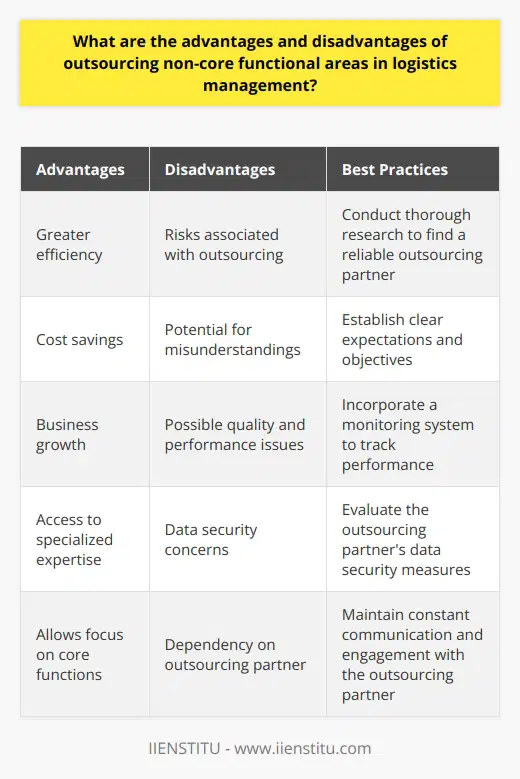
What is customer value in logistics management and how does it contribute to overall business success?
Understanding Customer Value in Logistics Management
Customer value in logistics management refers to the perceived benefits or satisfaction a customer experiences through the efficient delivery, storage, and transportation of goods within the supply chain. By focusing on customer value, logistics managers strive to meet or exceed customer expectations, thereby improving overall customer satisfaction, loyalty, and retention rates. This directly contributes to the overall business success as satisfying customers leads to repeat business, positive word-of-mouth marketing, and potential gains in market share.
Optimizing Service Quality and Efficiency
An essential aspect of customer value is the delivery of high-quality products and services (e.g., on-time shipments, excellent customer support) while minimizing logistics costs. By streamlining and optimizing logistics processes, businesses can improve service quality and efficiency, thus contributing to higher customer satisfaction levels. This proactive approach to managing logistics activities helps to eliminate inefficiencies, reduce the likelihood of missed deliveries or damaged goods, and enhance the overall customer experience.
Collaborative Partnerships
Collaboration is another critical factor in achieving customer value in logistics management. By building strong partnerships with suppliers, carriers, and other parties involved in the supply chain, companies can leverage these relationships to enhance service levels, reduce costs, and improve operational performance. Enhanced collaboration also allows businesses to identify and implement innovative solutions to common logistics challenges, further increasing customer value and positively contributing to overall business success.
Innovation and Adaptability
Embracing innovation and adaptability is crucial for maximizing customer value in logistics management. Integrating cutting-edge technologies, such as artificial intelligence, big data analytics, and IoT-enabled devices, can significantly impact operational efficiency and service quality. Moreover, adopting these innovative solutions allows companies to adapt to changing customer demands, industry trends, and external factors, such as economic fluctuations and global events. By remaining agile and open to change, businesses can consistently provide exceptional customer value while staying ahead of competitors.
In conclusion, customer value in logistics management plays a vital role in driving overall business success. By focusing on optimizing service quality and efficiency, enhancing collaboration, and embracing innovation and adaptability, companies can deliver exceptional customer value, achieve customer satisfaction and loyalty, and ultimately, improve business performance across all areas.
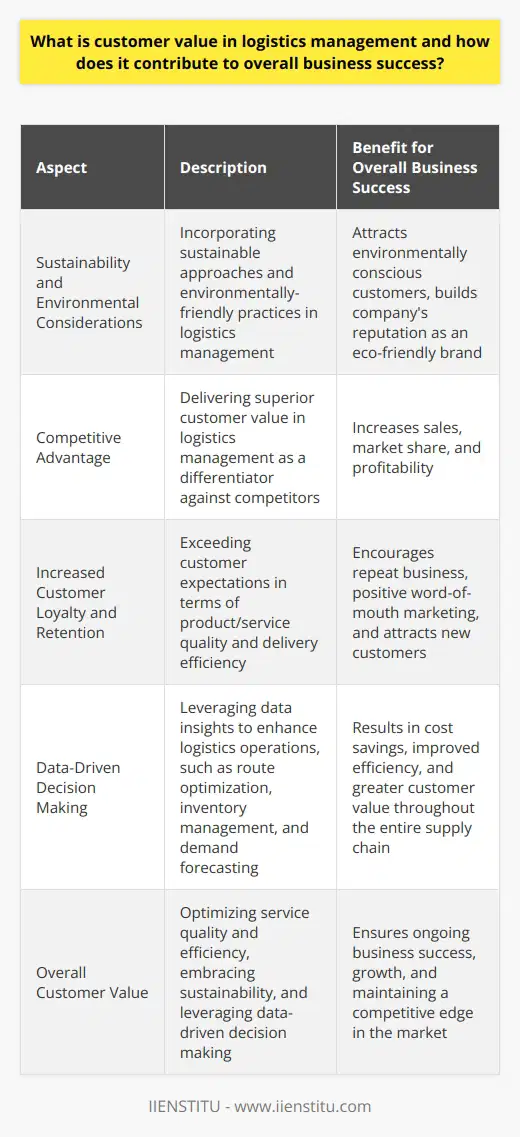
How do you maximize customer satisfaction in logistics without compromising efficiency and cost-effectiveness?
Understanding Customer Needs
To maximize customer satisfaction in logistics without compromising efficiency and cost-effectiveness, it is crucial to understand the specific needs and preferences of the target customer base. A thorough analysis of customer expectations and requirements, including delivery times, reliability, flexibility, and communication, enables a logistics provider to tailor its services accordingly.
Streamlining Operations and Warehousing
Efficient operations and warehousing processes are essential for enhancing customer satisfaction while maintaining cost-effectiveness. Implementing advanced techniques such as Just-In-Time (JIT) inventory management, automated systems, and lean warehousing practices can help logistics providers optimize their resources and minimize unnecessary costs. These measures allow for timely deliveries, improved flexibility, and efficient use of available resources, resulting in happy customers and a healthy bottom line.
Integrating Technology
Digital advancements provide significant opportunities for logistics providers to increase customer satisfaction while keeping costs under control. Integrating technologies such as Artificial Intelligence (AI), the Internet of Things (IoT), and data analytics into the supply chain can help enhance visibility, predictability, and real-time information sharing. Consequently, customers can enjoy better tracking and improved communication, significantly contributing to overall satisfaction levels.
Improving Last-Mile Delivery
The last-mile delivery aspect constitutes a critical element of customer satisfaction in logistics. To ensure a smooth and cost-effective last-mile delivery process, logistics providers should invest in innovative solutions such as route optimization software, crowd-sourced delivery services, and smart lockers. These technological interventions can help reduce delivery time, enable greater flexibility, and ensure that packages reach their intended recipients in perfect condition.
Enhancing Communication and Transparency
Transparent communication is vital in maintaining high levels of customer satisfaction. Logistics providers must invest in robust customer relationship management (CRM) systems, enabling the seamless exchange of essential information with customers. Facilitating real-time updates regarding shipment status, providing regular alerts about potential delays, and offering swift customer service support can significantly boost customer satisfaction while maintaining operational efficiencies.
In conclusion, maximizing customer satisfaction in logistics without compromising efficiency and cost-effectiveness requires a multifaceted approach. By understanding customer needs, streamlining operations, integrating technology, improving last-mile delivery, and enhancing communication and transparency, logistics providers can achieve a competitive edge in the market while maintaining strong customer satisfaction levels.
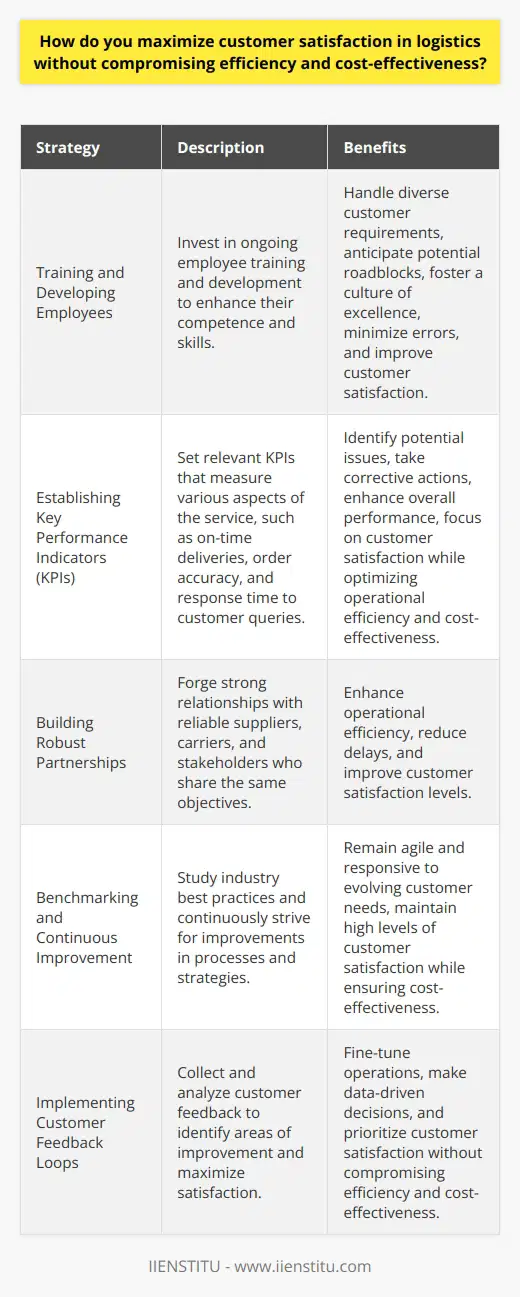
In what ways can effective logistics management add value to customers, and how can these benefits be measured?
Enhancing Customer Value through Logistics Management
Effective logistics management adds value to customers by improving product availability, reducing lead times, and increasing order accuracy. These benefits can be measured by examining three key aspects: cost savings, customer satisfaction, and competitive advantage.
Cost Savings
By optimizing inventory levels and transportation methods, logistics managers can minimize warehousing and transportation costs. This cost reduction directly benefits customers by allowing companies to offer more competitive pricing. The measurement of cost savings can be done by comparing expenses before and after implementing efficient logistics practices, such as lean warehousing or just-in-time inventory management.
Customer Satisfaction
Ensuring timely and accurate deliveries is another way to add value for customers. They can plan and schedule their operations more effectively when they trust that their orders will arrive as expected. To measure this aspect, logistics managers can track key performance indicators (KPIs) like order accuracy, on-time delivery rates, and order lead times. Enhancements in these KPI's indicate better customer satisfaction and increased loyalty.
Competitive Advantage
Efficient logistics management not only benefits customers but also helps companies stand out from their competitors. By offering a higher level of service, such as customized delivery options or faster shipping times, businesses can differentiate themselves from others in the market. This competitive advantage can be measured through market share growth, the number of new customer acquisitions, and customer retention rates.
In conclusion, effective logistics management contributes to customer value by optimizing costs, improving order execution, and creating competitive advantages. The benefits can be measured using cost analysis, KPI tracking, and market performance metrics. By closely monitoring these areas, companies can continuously improve their logistics operations and enhance the value they offer to their customers.
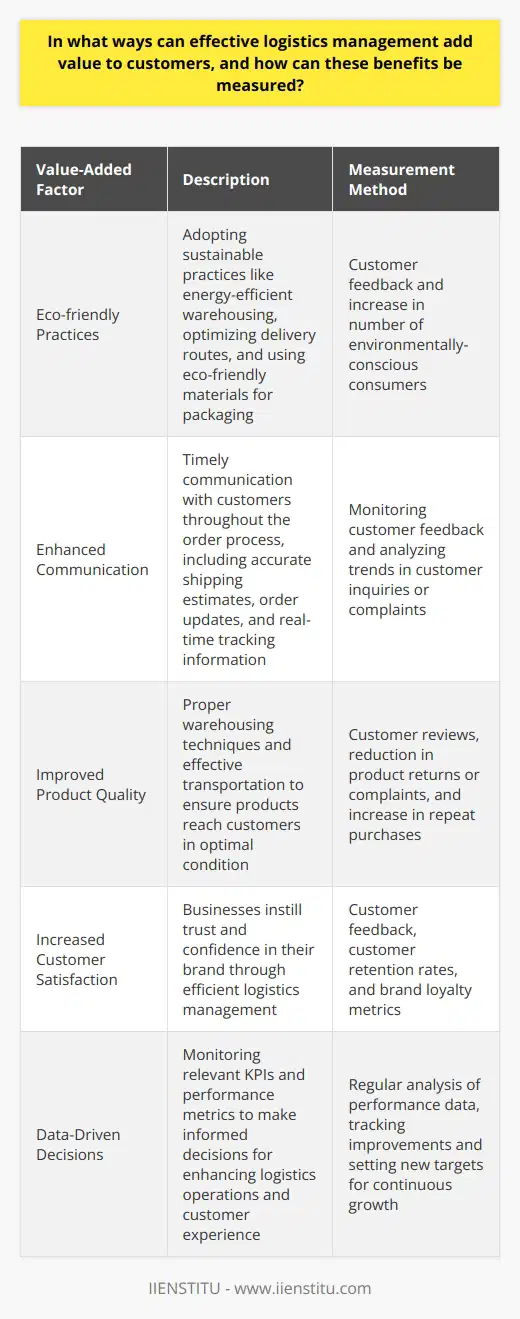
What are the key components of customer value in logistics management, and how can companies effectively implement them?
Key Components of Customer Value
The key components of customer value in logistics management include cost efficiency, time efficiency, reliability, responsiveness, and flexibility. By incorporating these components into their practices, companies can effectively enhance customer satisfaction and optimize their supply chain operations.
Cost Efficiency
Cost efficiency refers to the ability of a company to provide its services at competitive prices while maintaining profitability. In logistics management, achieving cost efficiency involves optimizing transportation costs, minimizing inventory holding costs, and reducing operational expenses. Companies can achieve this by negotiating favorable shipping rates, consolidating shipments, and implementing lean warehouse management practices.
Time Efficiency
Time efficiency is crucial in logistics management; it involves delivering goods and services to customers within the promised lead times. It requires streamlining processes like order processing, transportation scheduling, and warehouse management. Companies can improve time efficiency by adopting just-in-time inventory management, investing in advanced routing software, and automating order processing systems.
Reliability
Reliability in logistics management refers to consistently delivering products and services as promised. It entails meeting customer expectations regarding order accuracy, product quality, and delivery performance. Companies can enhance reliability by improving warehouse organization, employing quality control measures, and using advanced tracking systems to monitor shipments.
Responsiveness
Responsiveness refers to a company's ability to quickly adapt to rapidly changing customer needs and market conditions. In logistics management, it involves promptly addressing customer concerns, implementing contingency plans, and effectively handling unexpected disruptions in the supply chain. Companies can enhance responsiveness by investing in versatile technology solutions, cultivating strong relationships with suppliers, and employing effective communication strategies.
Flexibility
Finally, flexibility in logistics management is the ability to accommodate changes in customer demand and supply chain requirements. It involves adjusting inventory levels, transportation arrangements, and production schedules as needed. Companies can improve flexibility by adopting demand forecasting techniques, adopting a modular warehouse layout, and maintaining strong collaborative relationships with suppliers and carriers.
Conclusion
By understanding and focusing on the key components of customer value in logistics management—cost efficiency, time efficiency, reliability, responsiveness, and flexibility—companies can effectively implement strategies that enhance customer satisfaction and optimize their supply chain operations. This, in turn, will result in increased profitability for the organization, fostering long-term success within the competitive business landscape.
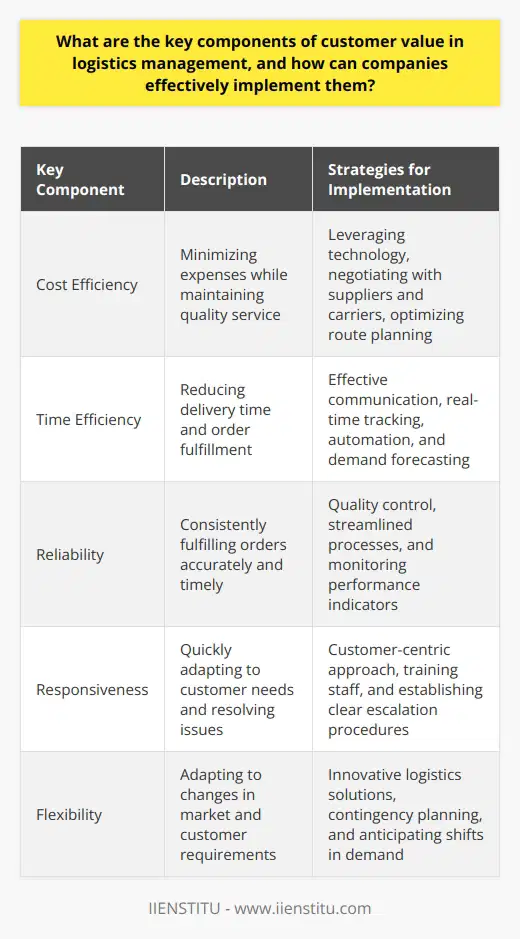
How have advancements in technology and digitalization impacted customer value and satisfaction in logistics management?
Impact on Customer Value
The advent of technology and digitalization has significantly transformed logistics management by enhancing customer value throughout the supply chain. The implementation of advanced systems, such as robotics and automated warehouse management, reduces operating costs and streamlines processes, leading to reduced lead times and increased responsiveness to customer demands.
Data-Driven Decision Making
The use of data analytics enables companies to make informed decisions based on real-time data, thus ensuring optimal resource allocation and enhanced operational efficiency. In turn, this facilitates better demand forecasting and inventory management, enabling businesses to avoid stockouts and overstock situations. Consequently, customers benefit from the availability of products they need, when they need them.
Improved Communication and Transparency
Technology has also played a vital role in improving communication and transparency between various stakeholders in the logistics chain. The integration of systems, such as GPS tracking and Internet of Things (IoT) devices, helps in monitoring shipments and providing real-time updates to customers. This increased visibility ensures timely deliveries and allows customers to accurately plan their operations, thereby enhancing their satisfaction levels.
Personalized Customer Experiences
Digitalization empowers companies to offer personalized customer experiences by leveraging customer data for targeted marketing campaigns and tailored service offerings. This, in turn, allows businesses to understand and anticipate customers' needs and preferences, which helps address potential issues before they escalate, ultimately leading to higher customer satisfaction rates.
Sustainable and Eco-Friendly Solutions
Additionally, technological advancements offer environmentally sustainable solutions in logistics management. As businesses increasingly adopt sustainable practices to mitigate their carbon footprint, customers are reassured that their choices align with their values, further strengthening their loyalty to these companies.
In conclusion, the technological advancements and digitalization have considerably impacted customer value and satisfaction in logistics management by streamlining processes, improving communication, and enabling businesses to offer personalized, eco-friendly solutions. This positive transformation enhances the overall customer experience and fosters long-term business relationships anchored on trust and mutual value.
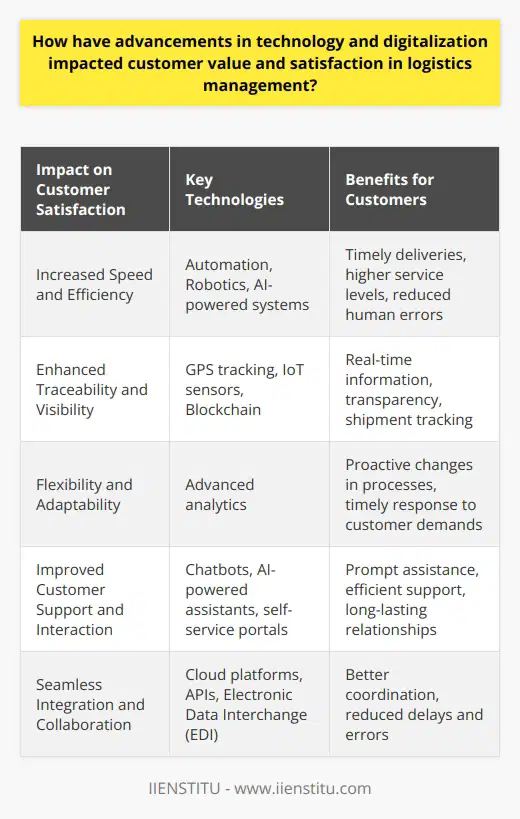
What role does sustainability play in enhancing customer value through efficient and responsible logistics management practices?
Role of Sustainability in Customer Value Enhancement
Sustainable logistics management focuses on the triple bottom line of economic, social, and environmental performance, ensuring the long-term success of a company. Incorporating sustainability into logistics practices can significantly enhance customer value by meeting their evolving preferences and expectations.
Aligning with Customer Expectations
Nowadays, customers increasingly demand environmentally friendly products and services. By implementing sustainable practices in logistics management, companies can cater to these needs and provide added value to their customers. For instance, reducing packaging waste and using fuel-efficient vehicles for transportation can appeal to eco-conscious consumers and win their loyalty.
Reducing Operational Costs
Efficient logistics management practices drive cost reductions and improve service levels, directly contributing to customer value. Sustainable practices, such as optimizing route planning and using energy-efficient vehicles, can reduce fuel consumption, emissions, and overall operational costs. The savings can be passed on to customers in the form of lower prices, improving customer satisfaction.
Improving Service Quality
Sustainability in logistics management can also lead to improved service quality. For example, adopting innovative technologies, such as electric vehicles and automated warehouse systems, can enhance the accuracy and speed of order fulfillment. This leads to reduced lead times and a better overall customer experience.
Managing Risk and Compliance
Companies that adopt responsible logistics practices can effectively mitigate the risk of disruption from new regulations and policies concerning environmental and social issues. By staying ahead of the curve, they can ensure uninterrupted services to their customers, increasing trust and competitiveness in the market.
Enhancing Brand Reputation
A company's commitment to sustainability sends a positive message to customers, resulting in stronger brand loyalty and reputation. The association of a company with sustainability and responsibility can attract a larger customer base and improve its market positioning.
In conclusion, sustainability plays a vital role in enhancing customer value by aligning with customer expectations, reducing operational costs, improving service quality, managing risk and compliance, and fostering a positive brand image. As the global focus on sustainability grows, companies that prioritize efficient and responsible logistics management practices will gain a competitive advantage in meeting customer needs and securing their loyalty.
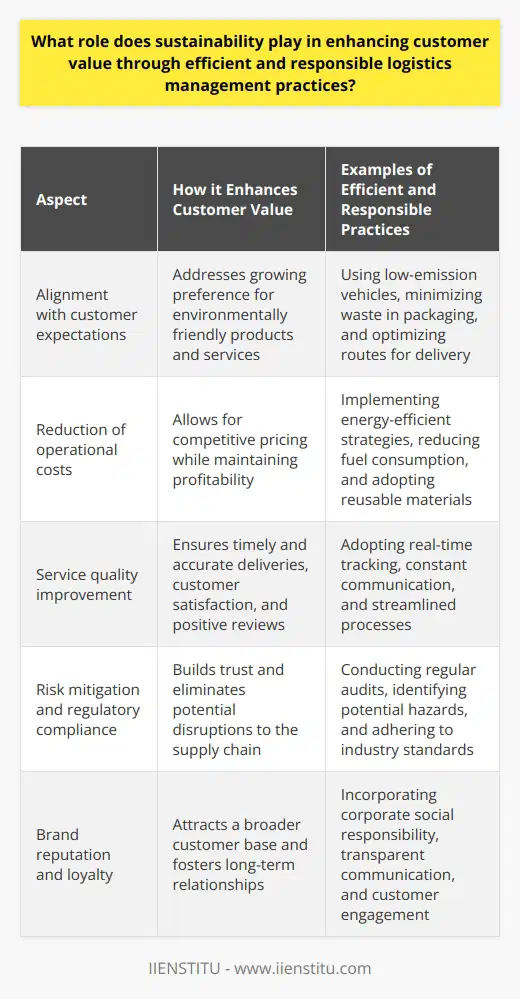
What are the key principles of customer-oriented logistics management, and how do they contribute to increased customer value?
Customer-centric Approach
The key principles of customer-oriented logistics management include the customer-centric approach, integrated logistics operations, continuous improvement, and flexibility. These principles significantly contribute to increased customer value by ensuring high-quality service delivery, cost efficiency, and timely responsiveness to customers' specific needs.
Service Quality and Customer Satisfaction
A customer-centric approach aims to provide excellent service quality, leading to increased customer satisfaction. This involves understanding the needs, preferences, and expectations of customers, and then aligning logistics operations to meet these requirements effectively. By prioritizing the customer's experience, logistics managers can ensure service delivery that exceeds expectations and builds loyalty, ultimately resulting in long-term customer relationships and repeat business.
Integration and Cost Efficiency
Integration of logistics operations offers seamless coordination and collaboration among different functions, such as procurement, transportation, warehousing, inventory management, and order fulfillment. This integration allows for better visibility and control, enabling managers to optimize processes, eliminate redundant activities, and reduce costs. In turn, cost efficiency benefits customers by reducing overall prices, while maintaining or even enhancing the quality of service.
Continuous Improvement and Innovation
Continuous improvement, based on periodic evaluation and feedback from customers, encourages innovation and ensures ongoing refinement of logistics processes. Embracing new technologies and best practices can help organizations stay ahead of the competition and deliver better value to customers. By investing in the continuous improvement of logistics operations, companies can maintain high service quality levels and adapt to evolving market and customer demands quickly.
Flexibility and Responsiveness
Flexibility in logistics management ensures that companies can quickly respond to changes in customer requirements, supply chain disruptions, or other unforeseen challenges. Logistics managers must be agile and adaptable to address fluctuating demand and supply conditions, mitigating potential negative impacts on customer satisfaction. Responsiveness and flexibility in logistics operations can lead to shorter lead times, timely delivery, and customized services, ultimately contributing to increased customer value.
In conclusion, customer-oriented logistics management relies on key principles such as a customer-centric approach, integrated operations, continuous improvement, and flexibility to enhance customer value. These principles enable organizations to meet evolving customer demands, improve cost efficiency, and ensure service quality, resulting in long-term customer loyalty and business success.
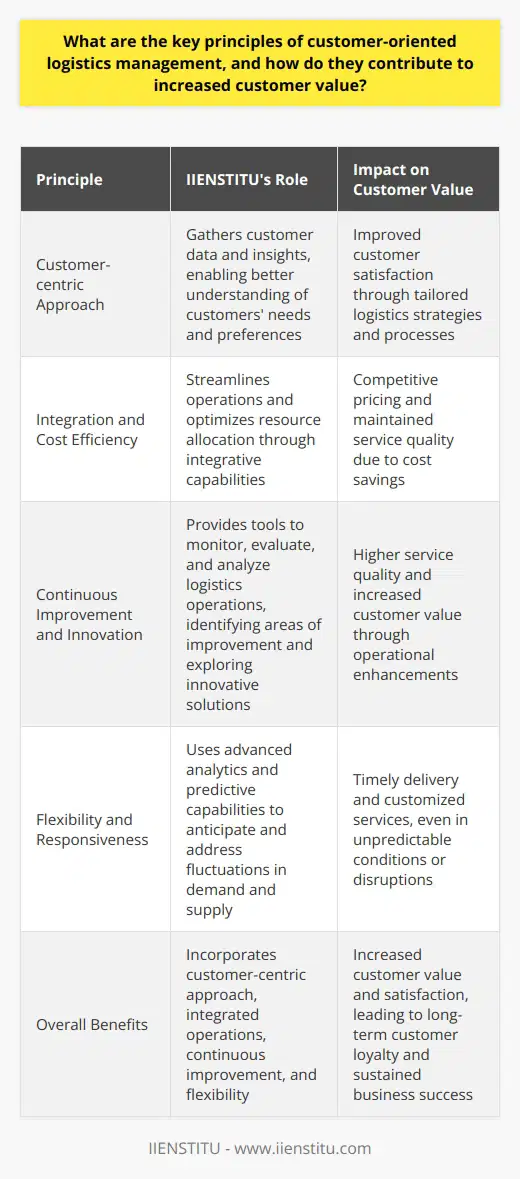
How can collaborative relationships between logistics providers and customers lead to enhanced customer value and satisfaction?
Collaborative Advantages
Fostering collaborative relationships between logistics providers and customers can significantly improve customer value and satisfaction. Collaboration entails sharing information, resources, and risk, ultimately achieving mutual benefits. A significant factor in creating customer value is understanding customers' expectations and needs. By engaging in active communication and transparent dialogue, both parties can set achievable goals and outline clear responsibilities. Additionally, proper integration of tools and technology can afford a seamless exchange of relevant data.
Efficient Supply Chain Management
Effective collaboration between logistics providers and customers contributes to successful supply chain management. Such a partnership can facilitate the adoption of innovative solutions like demand-driven optimization and just-in-time delivery strategies. Combining these approaches ensures inventory and distribution practices are in line with market fluctuations, resulting in increased responsiveness to customer preferences. Considering that customer satisfaction is a key determinant of competitiveness, this increased responsiveness directly contributes to an enhanced customer experience.
Risk Mitigation and Cost Control
Through collaborative efforts, logistics providers and customers can jointly address potential risks and challenges in supply chain management. By pooling their expertise and resources, they can design effective contingency plans to mitigate risks, including disruptions to transportation and fluctuations in demand. Moreover, shared cost management strategies can lead to optimized procurement practices, reducing operating expenses for both parties. This optimized cost structure ultimately signifies a more competitive pricing strategy, translating to enhanced customer value and satisfaction.
Sustainable Growth and Development
Establishing long-term collaborative relationships can create opportunities for sustainable growth and development. The continuous exchange of knowledge and best practices between logistics providers and customers fosters innovation and strategic development, providing a robust foundation for decision-making. Constant feedback loops enable the provision of updated customer-driven services, maintaining the relevance of the logistics provider in a dynamic market landscape. In turn, this ongoing evolution supports the growth of the customer, thereby strengthening the collaboration and facilitating long-lasting satisfaction.
In conclusion, developing collaborative relationships between logistics providers and customers is essential to achieve enhanced customer value and satisfaction. The inherent interplay between customer insight, efficient supply chain management, risk mitigation, and sustainable growth underpins this collaboration. By openly engaging in shared decision-making and continuously monitoring outcomes, logistics providers and customers can foster an atmosphere of trust and cooperation, ultimately leading to a more resilient and agile supply chain.
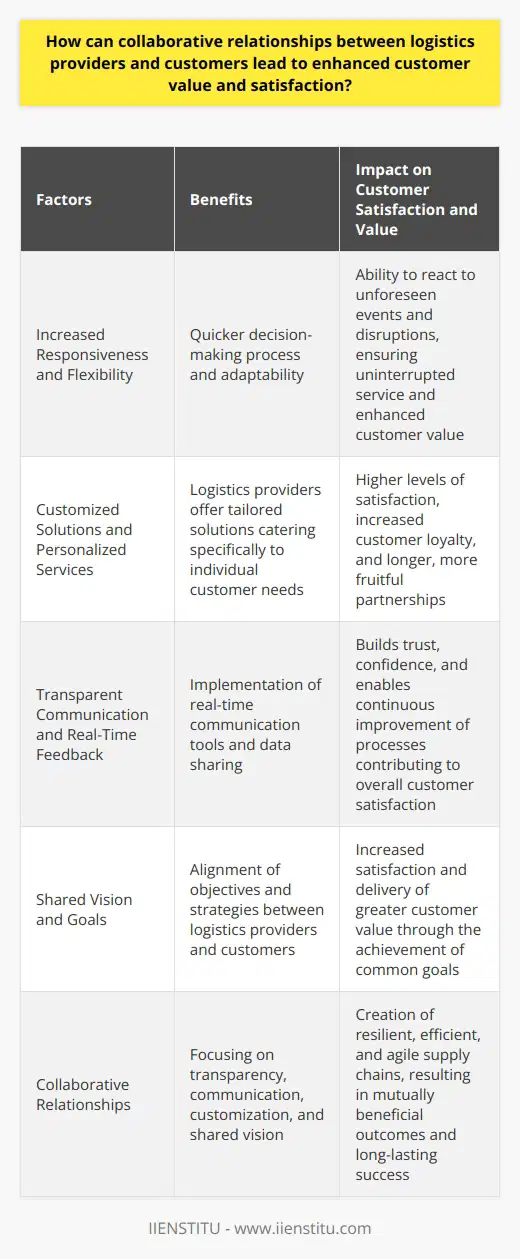
How have the principles of the lean supply chain and just-in-time delivery impacted customer value in logistics management?
Impact on Customer Value
The principles of the lean supply chain and just-in-time (JIT) delivery have significantly impacted customer value in logistics management by eliminating waste, optimizing inventory levels, and improving productivity. Firstly, lean and JIT methodologies focus on streamlining processes to reduce unnecessary costs and increase efficiency throughout the supply chain, directly benefiting customers by offering better quality products at competitive prices.
Efficient Inventory Management
Lean and JIT practices also contribute to optimized inventory management as they ensure the supply of the right quantity of goods at the appropriate time. By integrating forecasting techniques and real-time data, organizations can effectively anticipate customer demand, aligning stock levels accordingly. As a result, customers receive the products they require promptly, increasing satisfaction and strengthening loyalty.
Improved Responsiveness
Additionally, lean supply chain and JIT delivery principles promote responsiveness, enabling organizations to adapt quickly to fluctuations in market demand or unforeseen disruptions. This flexibility is particularly crucial in today's dynamic business environment, which often experiences sudden disruptions, and is crucial to maintaining customer trust and optimizing value. In turn, customers can rely on an effective logistics management system that adapts to their changing needs without compromising quality or performance.
Enhanced Product Quality
Furthermore, lean principles emphasize continuous improvement and error reduction in production processes, positively affecting the quality of the end product. By detecting and remedying defects swiftly and applying strategies to avoid their recurrence, businesses increase customer value by delivering superior-quality merchandise. Consequently, high product quality sets companies apart from competitors and fosters a positive brand image, validating the customer's choice to engage with a particular vendor.
Strengthened Supplier Relationships
Finally, lean supply chain and JIT delivery require strong collaboration between manufacturers, suppliers, and logistics providers. This collaboration leads to improved transparency and communication among parties, fostering long-term relationships based on mutual trust and understanding. As such, stronger supplier relationships indirectly benefit the end customer, as the delivery of goods is more reliable, consistent, and efficient.
In conclusion, lean supply chain and JIT delivery principles have greatly impacted customer value in logistics management. By enhancing efficiency, reducing waste, optimizing inventory, ensuring product quality, and fostering better supplier collaboration, customers receive better products and services on time and within their financial expectations. These changes contribute to increased customer satisfaction, trust, and loyalty, further helping businesses gain a competitive advantage in the logistics landscape.
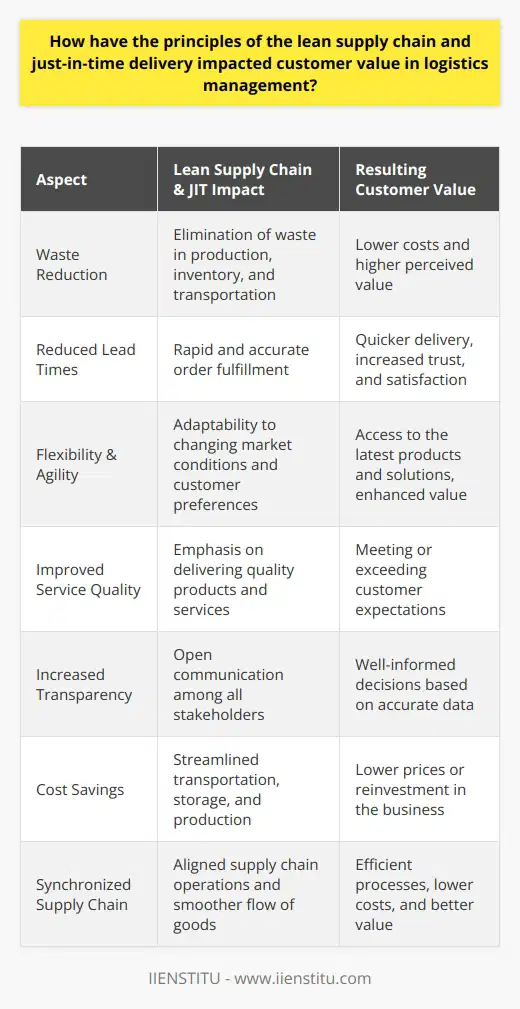
What are the 3 ways that logistics creates value for customers?
**Efficient Distribution**
One way in which logistics creates value for customers is through efficient distribution of goods. This is achieved by optimizing transportation routes, leveraging cutting-edge technologies to track shipments, and implementing strategic partnerships with reliable freight carriers. Consequently, customers receive their products quicker, minimizing the likelihood of delays or damages. In turn, this bolsters customer satisfaction and fosters long-term loyalty.
**Inventory Control**
Another way logistics adds value is by facilitating effective inventory control. This involves accurate forecasting of demand alongside robust planning, ensuring ample stock levels without unnecessary surplus. As a result, logistics professionals can minimize costs, maximize available storage space, and prevent stockouts or obsolete inventory. Customers, therefore, enjoy uninterrupted access to the products they need, providing a seamless shopping experience that fosters brand trust and repeat business.
**Customization and Flexibility**
Finally, logistics plays a crucial role in offering customization and flexibility for customers. This means providing tailored solutions to meet specific customer needs, such as varying delivery speeds, environmentally friendly packaging options, or additional services like installation or assembly. By catering to these unique requirements, logistics providers enhance the overall value proposition for customers, going beyond mere product availability to create a holistic, personalized, and customer-centric shopping experience.
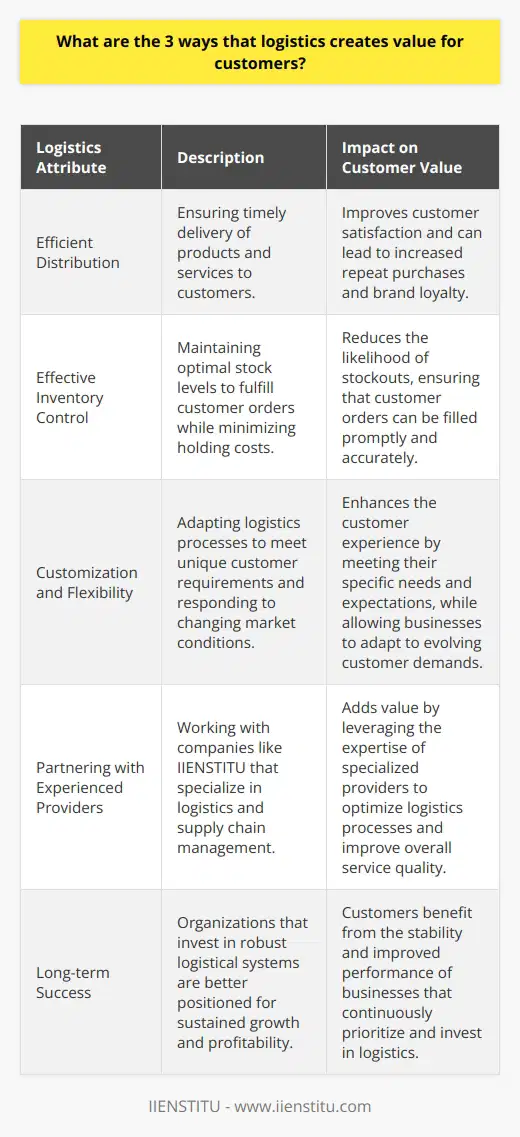
How logistics management can add value to customers?
Logistics Management and Customer Value
Enhancing Service Levels
Logistics management, when executed effectively, can add significant value to customers by enhancing service levels. This is achieved through timely delivery of goods, proper inventory management, and increased efficiency in the supply chain. Customers receive their desired products or services when and where they need them, resulting in improved customer satisfaction.
Reducing Costs
Another way logistics management adds value to customers is by reducing overall costs. By optimizing transportation and distribution routes, logistics managers minimize delivery times and fuel consumption. Effective warehousing strategies ensure optimal inventory levels, reducing the costs of holding excess stock. Consequently, these cost-saving measures translate into lower prices for customers without compromising product quality.
Improving Reliability
Reliable logistics operations allow companies to build trust and credibility among their customer base. Logistics management ensures the continuous flow of goods from suppliers to end-users, maintaining the visibility and traceability of shipments throughout the supply chain. By minimizing potential disruptions and delays, customers can count on dependable delivery, contributing to enhanced customer loyalty and long-term business relationships.
Promoting Sustainability
Today's customers are becoming increasingly concerned about the environmental impact of their purchases. Companies that incorporate sustainable practices in their logistics operations can appeal to this growing market segment. Solutions such as fuel-efficient transportation methods, reusable packaging materials, and reduced waste contribute to a greener supply chain, demonstrating a company's commitment to social responsibility and adding value to the customer experience.
Customizing Services
In today's competitive market, companies must differentiate themselves by offering personalized and unique solutions to their customers. Tailored logistics services, such as customized packaging or flexible delivery options, can help address individual customer needs and enhance their overall experience. By incorporating these services, logistics management serves as a key factor in strengthening customer relationships and building brand loyalty.
In conclusion, effective logistics management can significantly add value to customers by enhancing service levels, reducing costs, improving reliability, promoting sustainability, and customizing services. As a result, logistics management plays a critical role in fostering customer satisfaction and maintaining a competitive edge in the market. With a customer-centric approach, logistics managers can ensure long-term success for both their organizations and their customers.
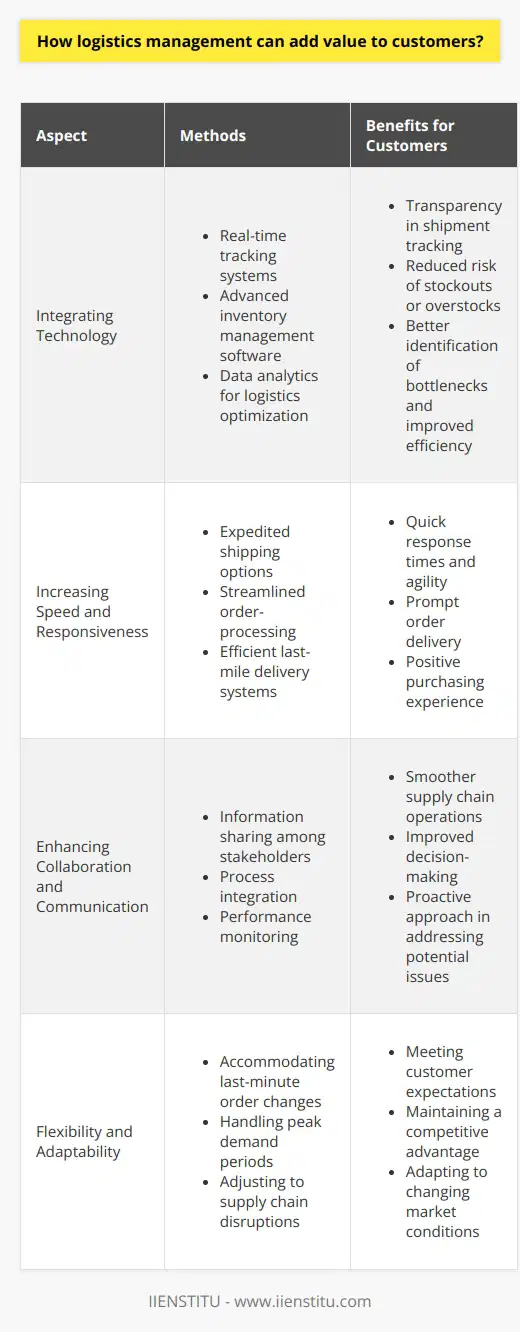
What is customer value in logistics management?
Customer Value in Logistics Management
Defining Customer Value
Customer value in logistics management can be understood as the efficient, reliable and cost-effective delivery of goods or services to customers, which results in a positive experience and fosters overall satisfaction. This concept revolves around the idea that the end goal of logistics activities should be focused on creating a valuable, problem-solving product or service for customers. Customer value can be both tangible and intangible and is influenced by customer needs, wants, and preferences.
Role of Logistics in Ensuring Customer Value
Logistics management plays a crucial role in maximizing customer value by streamlining the supply chain, ensuring products or services reach customers on time, meeting quality specifications and effectively handling any disruptions. Efficient logistics management is essential to achieve a high level of service quality and consistently delivering an optimal customer experience. Moreover, it can be a competitive differentiator for organizations, as it directly impacts business performance and profitability.
Logistics Activities that Add Customer Value
There are various logistics activities that contribute to creating customer value, and they are focused on enhancing the overall customer experience. Some of these activities include:
Demand and Supply Planning: Accurate forecasting and inventory management can help ensure timely availability of products, fulfilling customer demands and avoiding stockouts or overstock situations.
Transportation Management: Implementing optimization strategies that minimize delays and reduce overall transportation costs can positively impact customer satisfaction levels.
Warehousing and Distribution: Effective management of storage, handling, and order fulfillment processes can help businesses minimize lead times, reduce order errors, and ensure faster product delivery to customers.
Reverse Logistics: Efficiently managing returns, repairs, and recycling processes can contribute to improved customer service and resource utilization.
Customer Service and Communication: Seamless communication and quick resolution of customer queries can lead to increased loyalty and trust.
Continuous Improvement for Enhanced Value
One of the central aspects of realizing customer value in logistics management is the continuous improvement of processes, operations, and service offerings. Implementing advanced technological systems and leveraging data-driven insights can help businesses identify and target areas of inefficiency, allowing for tangible improvements in achieving a higher degree of customer delight.
In a nutshell, customer value in logistics management is the result of efficiently executing various logistics activities that work in unison to meet and surpass customer expectations. By continuously improving processes, organizations can enhance customer value and build long-lasting, trust-based relationships with their clients.
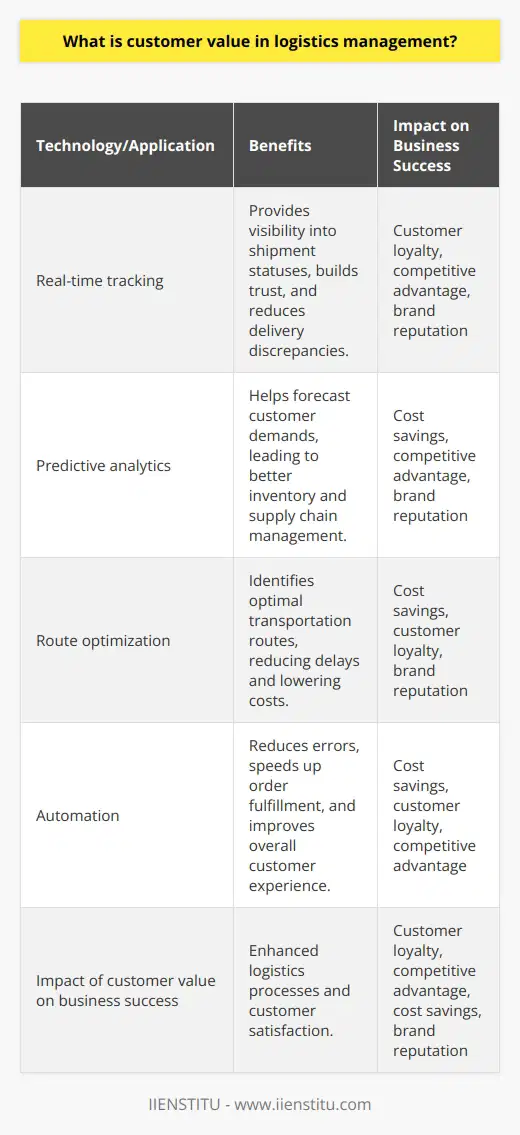
What are the 7 R's of customer service in logistics and how do they contribute to overall customer value?
Understanding the 7 R's
The 7 R's of customer service in logistics refer to a set of key principles that contribute to overall customer value. They are the foundation for providing efficient and effective service, ultimately leading to satisfied customers and long-term business success. By understanding each of these principles, companies can enhance their service quality and strengthen customer relationships.
Right Product
Providing the right product means ensuring that customers receive the exact items they ordered, delivered in perfect condition. This requires accurate inventory management and effective quality control systems, which contribute to customer satisfaction and build trust in the company's services.
Right Quantity
Supplying the right quantity involves fulfilling orders with the exact number of items specified by the customer. This requirement helps avoid scenarios of over- or under-supply, ultimately reducing the likelihood of customer complaints and returns, leading to better overall value for the customer.
Right Condition
Ensuring products arrive in the right condition guarantees that items remain unharmed during the shipping and handling process. Proper packaging materials and techniques, as well as careful transportation methods, protect items from damage and deterioration, consequently preventing customer dissatisfaction.
Right Place
Delivering to the right place entails ensuring that orders reach the correct destination specified by the customer. Efficient route planning and accurate delivery address information contribute to punctual deliveries, minimizing inconvenience for the customer and improving overall satisfaction.
Right Time
Fulfilling orders at the right time means delivering items within the time frame agreed upon when the order was placed. This aspect necessitates effective time management and reliable logistics systems to ensure punctual deliveries, providing customers with added value and convenience.
Right Cost
Presenting the right cost requires offering competitive and transparent pricing for products and services. Providing customers with clear pricing information and avoiding hidden fees is essential for maintaining fairness and nurturing long-term business relationships.
Right Customer
Targeting the right customer involves recognizing and catering to individual needs and preferences. By offering personalized and tailored services, companies demonstrate their commitment to satisfying unique customer requirements, leading to increased customer loyalty and long-term value.
In conclusion, the 7 R's of customer service in logistics ensure that companies deliver high-quality, efficient services, which contribute to overall customer value. By adhering to these principles, businesses can achieve improved satisfaction, strengthen customer relationships, and enjoy long-term success in a competitive market.
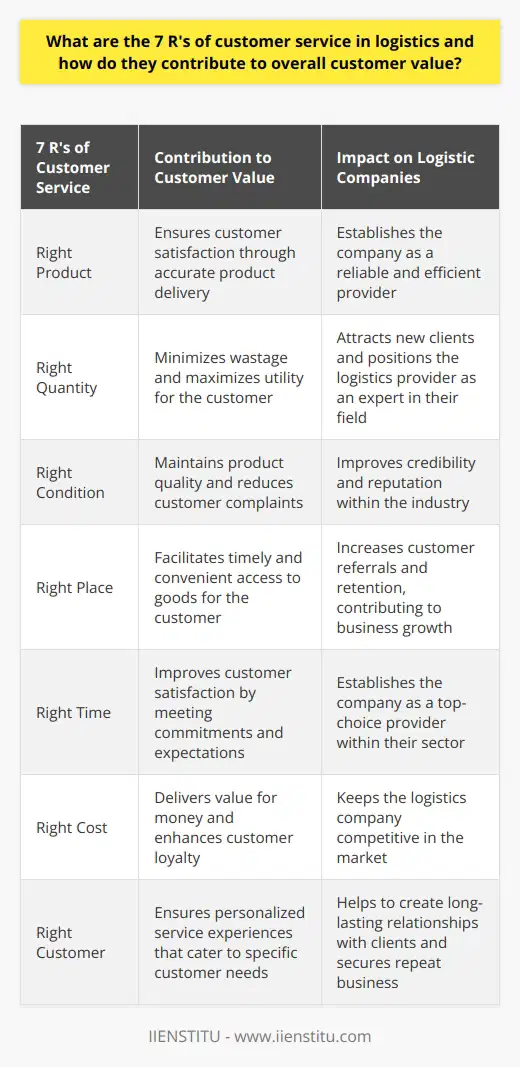
How does logistics and supply chain management enhance customer value through efficient operations and effective coordination?
Efficient Operations in Logistics and Supply Chain Management
Efficient operations are vital to meeting customer demands, reducing costs, and improving overall service. In logistics and supply chain management, these efficiencies can be achieved through streamlined processes, optimized decision-making, and technological advancements. One example is the use of warehouse management systems that help manage inventory, reduce waste, and ensure accurate order fulfillment. Additionally, adopting lean manufacturing principles can lead to reduced lead times, allowing organizations to respond quickly to customer needs.
Effective Coordination of Activities
Effective coordination within a supply chain enables smoother communication, better utilization of resources, and quicker response to market changes. Collaboration between various stakeholders, such as suppliers, manufacturers, and retailers, is essential to achieve balanced inventory levels, accurate demand forecasts, and reduced lead times. By incorporating advanced technologies like IoT and blockchain, organizations can enhance transparency, thereby improving trust and collaboration among all parties involved.
Customization and Personalized Services
Today's customers expect tailored solutions to suit their preferences and requirements. By leveraging data analytics, organizations can better understand customer behavior and preferences, which enables them to provide customized offerings, enhancing customer value. For instance, companies increasingly use demand-driven material requirements planning (DDMRP) to predict demand and personalize their supply chain management.
Sustainability and Environmental Impact
Incorporating sustainability practices in logistics and supply chain management can ensure long-term customer value. Eco-friendly initiatives such as reducing packaging waste, optimizing transportation routes, and adopting green manufacturing processes demonstrate a company's commitment to societal and environmental well-being. As customers become more environmentally conscious, these sustainable practices can translate into increased brand loyalty and positive reputation.
Conclusion
In conclusion, logistics and supply chain management enhance customer value through efficient operations and effective coordination by streamlining processes, optimizing resource utilization, and incorporating advanced technologies. Additionally, focusing on customization and personalized services, as well as adopting sustainability practices, strengthens customer relationships and contributes to long-term success.
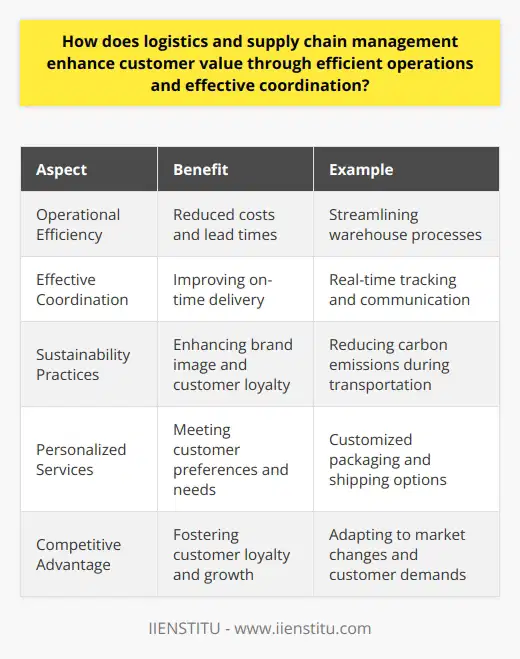
In what ways do emerging trends and innovations in logistics management, such as automation and artificial intelligence, impact customer value and satisfaction?
Impact on Customer Value
Emerging trends and innovations in logistics management, particularly automation and artificial intelligence, greatly impact customer value in several ways. By streamlining processes, they reduce operational costs and increase efficiency, leading to reduced product prices and improved supply chain visibility. The implementation of these technologies can also result in a more responsive and agile supply chain, strengthening customer trust and yielding higher value.
Improving Customer Satisfaction
Customer satisfaction is also enhanced through automation and artificial intelligence. For example, real-time tracking abilities enable customers to monitor their deliveries, providing transparency and reducing uncertainties. Moreover, predictive analytics driven by artificial intelligence helps companies anticipate demand patterns and better manage inventory, resulting in higher product availability. Consequently, customers can receive their orders more quickly and accurately while minimizing stockouts and delays, increasing their overall satisfaction.
Personalization and Customization
Further, these innovations can enhance customer value and satisfaction by facilitating personalization and customization. Automated systems can collect and analyze consumer data more effectively, allowing companies to better understand their preferences and meet their expectations. Thus, logistics providers can tailor the customer experience, ranging from unique packaging to tailored delivery options, fostering customer loyalty and increasing brand equity.
Environmental Sustainability
Finally, the adoption of automation and artificial intelligence in logistics management can promote environmental sustainability, an increasingly important factor for customers. For instance, route optimization technologies minimize fuel consumption and emissions while autonomous vehicles may rely on cleaner energy sources. By reducing their environmental footprint, companies improve their corporate social responsibility, which positively influences customer perceptions and satisfaction.
In conclusion, advancements in logistics management through automation and artificial intelligence substantially impact customer value and satisfaction. These innovations support cost efficiency, supply chain responsiveness, personalization, and environmental sustainability, ultimately leading to more satisfied and loyal customers.
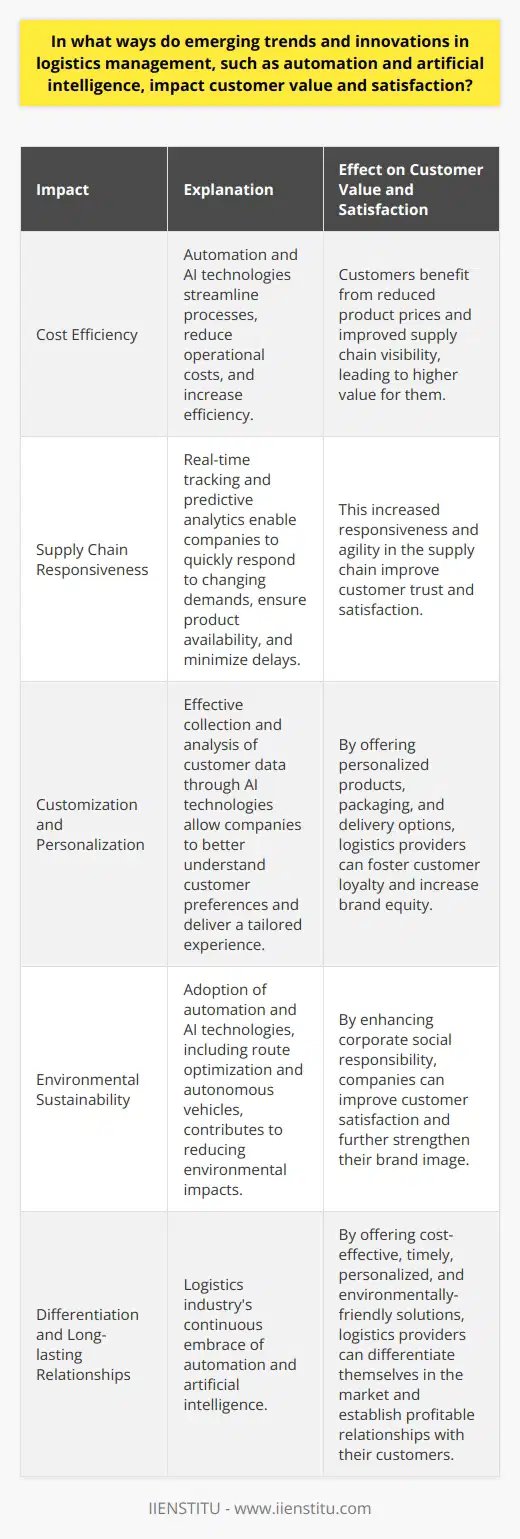
How does the integration of logistics and supply chain management affect customer value and competitive advantage?
Impact on Customer Value
By integrating logistics and supply chain management, companies can significantly enhance customer value. This integration allows for streamlined operations, reduced costs, improved delivery times, and increased stock visibility. As a result, businesses can consistently meet customer demands, thus increasing their overall satisfaction. The ability to provide end-to-end visibility into the supply chain also empowers consumers with accurate information on product availability and delivery estimates, further solidifying their confidence in the company.
Competitive Advantage through Efficiency
In today's highly competitive market, businesses must leverage every opportunity to gain an edge over their rivals. By attaining operational efficiency through the integration of logistics and supply chain management, firms can reduce lead times, minimize inventory costs, and optimize the order-fulfillment process. Additionally, the collected data can be analyzed to identify trends, forecast demand, and make informed decisions related to procurement, production, and distribution. Consequently, this level of efficiency translates into a significant competitive advantage in a market where efficiency and speed are vital for success.
Risk Mitigation and Adaptability
Another crucial aspect of integrated logistics and supply chain management is the ability to mitigate risks and respond to disruptions swiftly. By linking the various supply chain components and centralizing information, organizations gain a holistic view of their operations. This visibility enables companies to quickly identify potential vulnerabilities, reduce bottlenecks, and enhance communication between various departments. In the event of unforeseen disruptions, such as natural disasters or global pandemics, businesses with integrated supply chains are better equipped to adapt and adjust their strategies, minimizing the impact on customer value and overall competitiveness.
Sustainability and Ethics
Lastly, a well-integrated logistics and supply chain management system can positively influence a company's sustainability and ethical practices. By identifying areas of inefficiency, businesses can implement environmentally-friendly measures, such as reducing waste, optimizing transportation routes, and lowering carbon emissions. Additionally, enhanced visibility and traceability within the supply chain allows organizations to ensure ethical procurement and production practices. As consumers increasingly demand socially responsible products, companies that embrace sustainability and maintain ethical supply chains can bolster their reputation and customer loyalty, thereby securing a long-lasting competitive advantage.
In conclusion, the integration of logistics and supply chain management directly affects customer value and competitive advantage through improved efficiency, risk mitigation, adaptability, and sustainability. By leveraging these strategies, companies can not only optimize their operations but also build a reputation as an industry leader and a customer-centric and ethical organization.
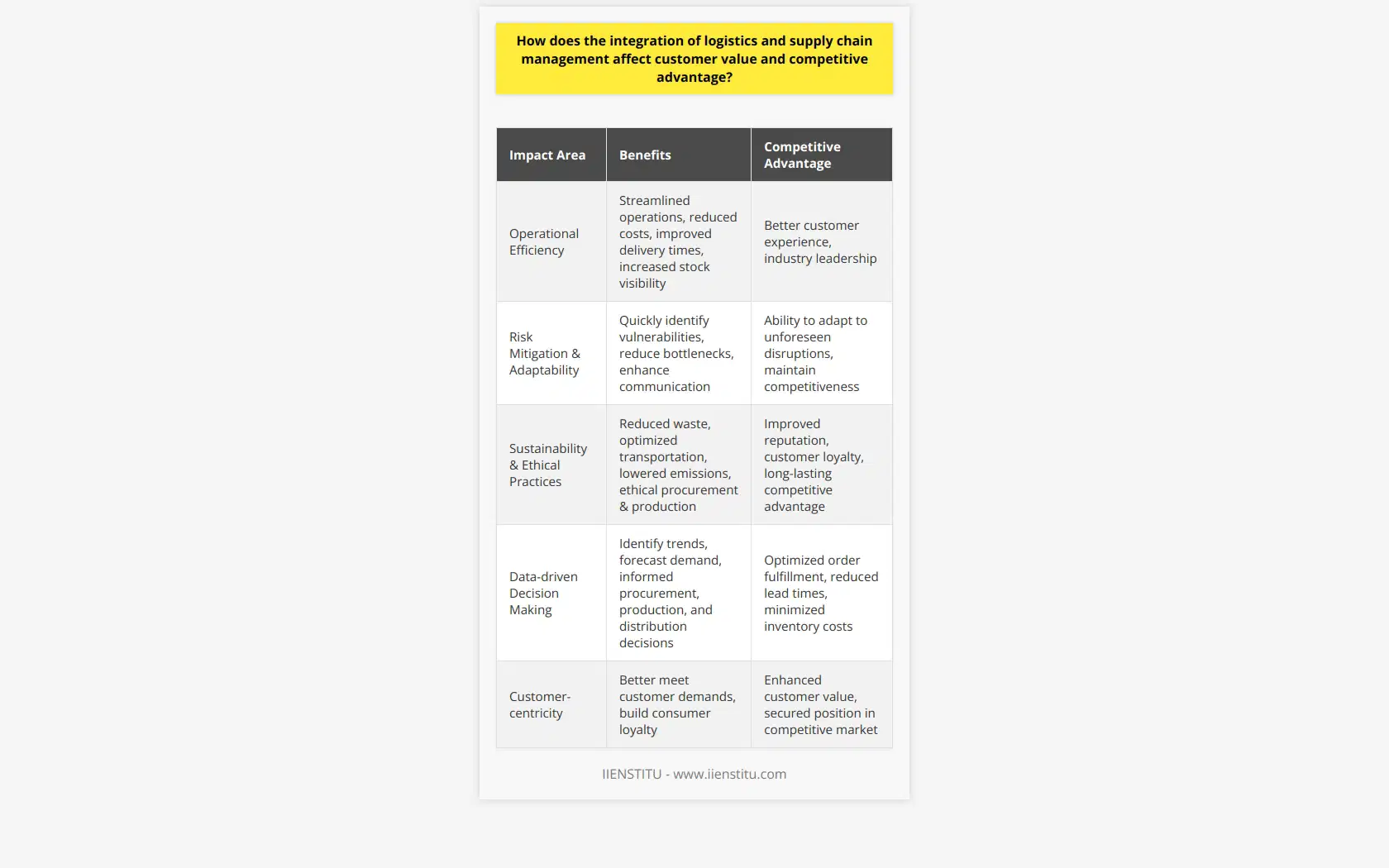
In the context of logistics management, how does the focus on customer value contribute to the development of long-term and sustainable business relationships?
Customer Value-Driven Logistics Management
A primary focus in logistics management is providing customer value, ultimately driving the development of long-term and sustainable business relationships. Companies that prioritize understanding and meeting customer expectations enjoy long-lasting partnerships and improved brand reputation.
Alignment of Business Goals
By aligning business goals with customers' needs and objectives, the logistics management process enables organizations to contribute positively to customer value, fostering trust and loyalty. Companies that invest in delivering the best value to customers, including cost-effective solutions, often positively impact satisfaction levels and create a foundation for sustainable relationships.
Effective Communication
Effective communication is crucial in enhancing customer value and supporting long-term business relationships. By considering customer feedback and suggestions, logistics managers can comprehend their needs and preferences better. As a result, businesses can make data-driven decisions to streamline processes and improve their services.
Customized Solutions
Offering customized logistics solutions contributes significantly to customer value, which in turn strengthens business relationships. By tailoring services to meet specific customer requirements, logistics managers show adaptability and commitment – both essential aspects in maintaining long-term partnerships.
Timely Service Delivery
Efficient and timely service delivery is another essential factor in nurturing customer value within logistics management. Companies that can meet deadlines consistently and fulfill customers' requirements demonstrate reliability and credibility, which are crucial for long-term relationships and achieving business sustainability.
Building Long-Term Partnerships
Through the strategic development and implementation of customer value-driven logistics management practices, companies can effectively build long-term and sustainable business relationships. These efforts contribute to a strengthened supply chain, increased revenue generation, and overall business growth.
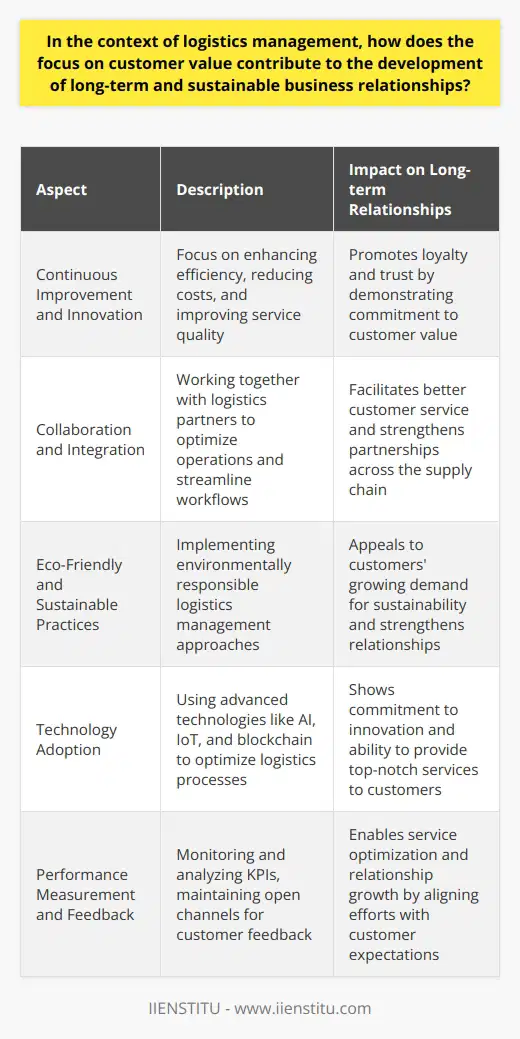
What are the various ways in which digital transformation and emerging technologies are revolutionizing logistics management, and how do these advancements contribute to increased customer value?
**Digital Transformation in Logistics Management**
Digital transformation and emerging technologies are revolutionizing logistics management in a variety of ways, including real-time tracking, automation, enhanced collaboration, and the use of advanced analytics. These advancements not only improve operational efficiency but also contribute to increased customer value.
**Real-Time Tracking and Visibility**
A key benefit of digital transformation in logistics is the ability to track shipments in real time. With the implementation of Internet of Things (IoT) devices, GPS tracking systems, and other smart technology, companies can now monitor the location, condition, and progress of their shipments with greater accuracy and efficiency. This increased visibility allows businesses to make better decisions, reduce lead times, and ultimately improve customer satisfaction.
**Automation and Robotics**
Emerging technologies such as robotics and automation play a significant role in enhancing logistics management. Through the use of automated warehouse systems, robotics-assisted loading and unloading, and autonomous vehicles, companies can streamline their operations, reduce labor costs, and minimize human error. As a result, businesses can accelerate their logistic processes, enabling faster delivery of goods and services to customers.
**Enhanced Collaboration through Digital Platforms**
Digital transformation has also facilitated improved collaboration among stakeholders in the logistics ecosystem. Companies can now harness digital platforms, such as cloud-based software and blockchain technology, to securely share information and conduct transactions with suppliers, carriers, and end customers. This enhanced communication and data exchange leads to better coordination, improved transparency, and stronger relationships, ultimately resulting in improved customer value.
**Advanced Analytics and Data-Driven Decision Making**
Lastly, digital transformation allows for the use of advanced analytics in logistics management. By collecting and analyzing vast amounts of data from various sources, companies can gain valuable insights into their supply chain operations. These insights enable businesses to identify inefficiencies, predict potential disruptions, and optimize their logistics processes to enhance customer value.
In conclusion, digital transformation, backed by emerging technologies, is revolutionizing logistics management in numerous ways. By allowing for real-time tracking, automation, enhanced collaboration, and advanced analytics, companies can not only improve their operational efficiency but also significantly contribute to increased customer value. These advancements are reshaping the logistics landscape, paving the way for a more agile and responsive industry.
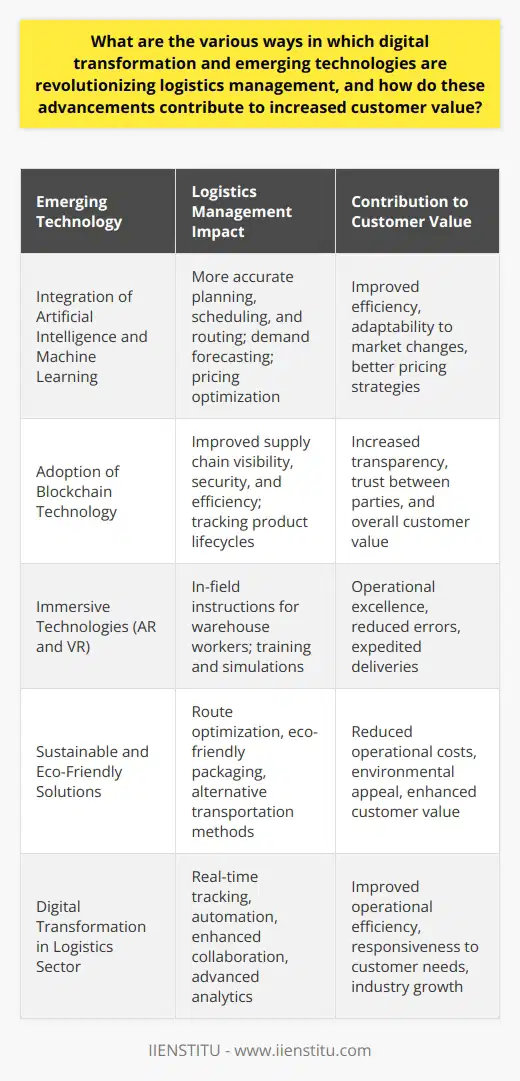
How can logistics management effectively balance the trade-offs between cost, speed, and service to optimize customer value?
Optimizing Customer Value in Logistics Management
Balancing Trade-offs in Cost, Speed, and Service
Effective logistics management requires a delicate balance between cost, speed, and service to optimize customer value. To achieve this equilibrium, organizations must adopt a customer-centric approach that prioritizes customer needs and preferences. This involves carefully assessing the organization's supply chain capabilities and aligning them with customer expectations while remaining cost-competitive.
Integrating Technology-driven Solutions
The integration of technology-driven solutions, such as analytics, artificial intelligence (AI), and the Internet of Things (IoT), can significantly enhance logistics management processes. These technologies enable organizations to gather valuable data regarding end-to-end supply chain operations, providing insights into performance and cost-efficiencies. Furthermore, the use of advanced analytics and simulation tools enables informed decision-making on resource allocation, transportation choices, and inventory management.
Differentiation through Customization
An essential aspect of optimizing customer value is offering customized solutions tailored to different customer segments. By providing flexible and individualized options, organizations can achieve higher customer satisfaction and brand loyalty. This differentiation strategy entails understanding customer needs, prioritizing the service dimensions that matter most, and offering tailored service packages aligned with individual customer requirements.
Collaborative Approach with Supply Chain Partners
Enhanced collaboration with supply chain partners is critical to ensure that all stakeholders work in harmony to optimize customer value. This collaboration involves sharing information, resources, and best practices with suppliers, transportation providers, and distributors to ensure seamless integration of end-to-end logistics processes. Effective communication is vital in these collaborations to align expectations, responsibilities, and performance targets.
Continuous Improvement and Lean Practices
To maintain the fine balance between cost, speed, and service in logistics management, organizations should adopt continuous improvement and lean practices. This approach involves identifying key performance indicators (KPIs) that measure customer value delivery and consistently working on improving those metrics. Integrating lean principles into logistics processes, such as inventory management, transportation, and order fulfilment, can help organizations eliminate waste, enhance efficiency, and deliver better value to their customers.
In conclusion, effective logistics management should focus on balancing cost, speed, and service to optimize customer value. Integrating technology-driven solutions, offering customized services, enhancing collaboration with supply chain partners, and adopting continuous improvement and lean practices are key strategies to managing the trade-offs between these dimensions and delivering exceptional value to customers.
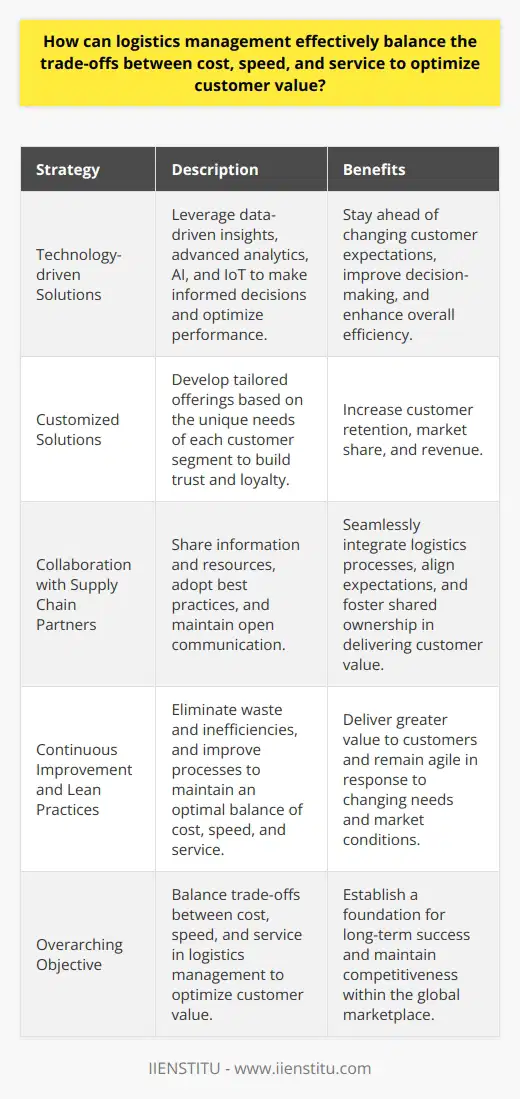
What key performance indicators should be utilized in logistics management to measure and improve customer value?
Essential KPIs for Evaluating Customer Value in Logistics Management
Customer Order Cycle Time
One crucial performance indicator in logistics management is the customer order cycle time, which measures the duration between receiving a customer order and fulfilling it. This KPI helps assess the efficiency of order processing and delivery, ensuring customers receive their goods promptly.
On-Time Delivery Rate
The on-time delivery rate evaluates the percentage of orders delivered within the agreed timeframe. High on-time delivery rates demonstrate reliability and improve customer satisfaction, contributing to increased customer value.
Order Accuracy
Accurate order fulfillment is another essential KPI in logistics management. This indicator gauges the proportion of orders delivered without any errors, such as wrong items, quantities, or shipping information. Higher order accuracy reduces returns, refunds, and customer complaints, enhancing customer value.
Inventory Turnover
Inventory turnover is a measure of how frequently a company's inventory is sold and restocked during a specific period. A high inventory turnover indicates efficient inventory management, enabling the business to minimize stockholding costs and maintain competitive pricing, thereby increasing customer value.
Stock Availability
Ensuring stock availability is vital in supply chain management, as it measures the percentage of products available in the warehouse when a customer places an order. Adequate stock availability reduces stockouts, backorders, and lost sales opportunities, translating to improved customer satisfaction and value.
Transportation Cost per Unit
This KPI calculates the total transportation cost incurred for delivering each product unit. Reducing transportation costs can help businesses offer lower prices or absorb price fluctuations while maintaining profitability, ultimately enhancing customer value.
Returns Ratio
Lastly, the returns ratio calculates the proportion of products returned by customers due to issues such as defects or order inaccuracies. A low returns ratio reflects a high-quality product and efficient logistics management, contributing to increased customer value.
In conclusion, the implementation of these essential KPIs in logistics management enables businesses to monitor and optimize their operations, ensuring timely deliveries, accurate orders, and cost efficiency, which ultimately drives customer value and satisfaction.
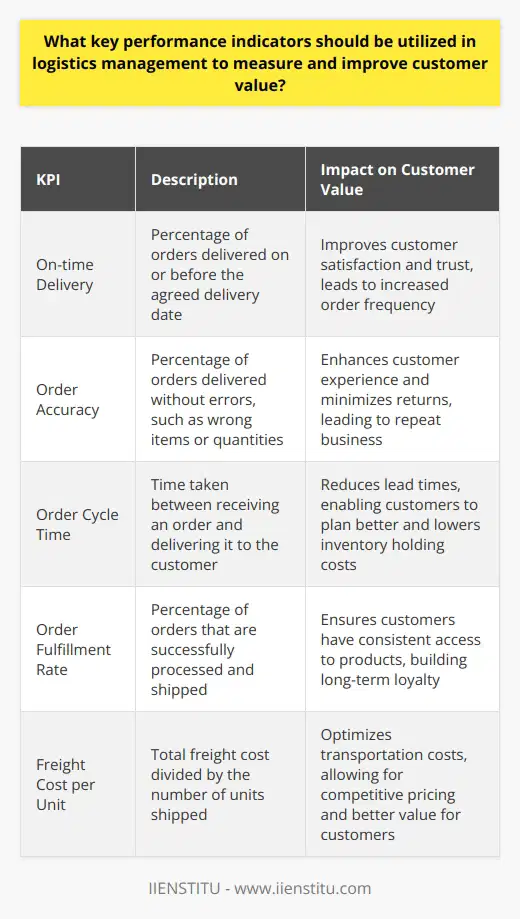
In the context of an increasingly customer-centric market, how can logistics management adapt its practices and strategies to better align with evolving customer expectations and needs?
Customer-Centric Approach in Logistics
To adapt to an increasingly customer-centric market, logistics management can revamp its practices and strategies by focusing on enhancing customer satisfaction. This includes offering a variety of delivery options, providing clear communication, and streamlining the returns process.
Flexible Delivery Options
A key factor in aligning with customer expectations is offering flexible delivery options. Logistics management can achieve this by understanding customer preferences and providing options such as same-day delivery, scheduled delivery, and in-store pickup. These choices cater to different customer needs, improving satisfaction and forging stronger relationships.
Clear Communication
Transparent communication is essential in establishing trust and satisfaction. As such, logistics management can utilize real-time tracking systems, enabling customers to monitor their orders with ease. Additionally, proactive communication should be implemented to notify customers of unforeseen delays or issues that may impact delivery. This openness allows for better customer understanding and fosters positive experiences.
Streamlined Returns Process
An efficient returns process can further improve customer loyalty. Logistics management should focus on simplifying returns by offering prepaid shipping labels, easy-to-follow instructions, and hassle-free drop-off options. This strategy can shorten return times, enhancing overall customer experience and encouraging repeat business.
Data-Driven Decision Making
Utilizing data analytics tools can assist logistics management in identifying trends, predicting customer expectations, and implementing targeted strategies to meet these demands. By continuously monitoring customer preferences, logistics management can make data-driven decisions to remain competitive and align their services with customers' evolving needs.
Collaboration and Integration
Lastly, logistics management can establish strategic collaborations and integrate their practices with other elements of the supply chain. This alignment allows for improved overall performance, faster response times, and better adaptability to customer requirements. Moreover, collaborating with various stakeholders can lead to innovative solutions tailored to specific customer segments.
In conclusion, logistics management can adapt its practices and strategies to meet the evolving expectations and needs of customers in an increasingly customer-centric market by focusing on delivery flexibility, transparent communication, a streamlined returns process, data-driven decision-making, and fostering collaboration and integration with other supply chain stakeholders.
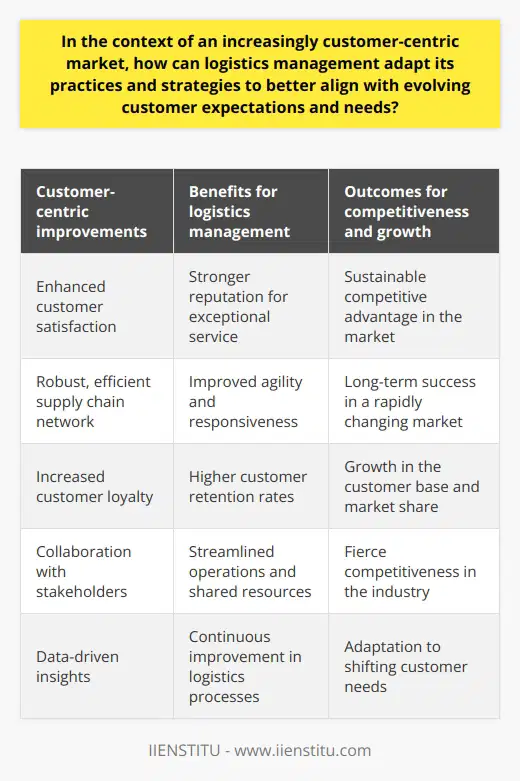
How do you maximize customer satisfaction logistics while maintaining a balance between cost, efficiency, and service?
Balancing Cost, Efficiency, and Service
To maximize customer satisfaction in logistics, it is essential to find the optimal balance between cost, efficiency, and service. This can be achieved by continuously reviewing and fine-tuning processes in order to fulfill customer needs promptly and accurately while minimizing operational costs, thereby creating a sustainable business model.
Innovative Technologies
The integration of innovative technologies, such as artificial intelligence, the Internet of Things, and big data analytics, can facilitate informed decision-making and enhance operational efficiency. Adopting these technologies can streamline the supply chain, automate manual tasks, and provide valuable insights for improving customer service.
Strategic Partnerships
Establishing strategic partnerships with key stakeholders, such as suppliers and third-party logistics providers, can enable a collaborative approach towards achieving mutual goals. These collaborations can lead to better resource utilization, cost-sharing, and improved communication, resulting in a more agile and efficient logistics operation.
Personalized Customer Service
A strong focus on personalized customer service can enhance the overall user experience and contribute significantly to customer satisfaction. By adopting a customer-centric approach and providing tailored services based on the specific needs of individual clients, logistic companies can further differentiate themselves in an increasingly competitive market environment.
Continuous Improvement
Implementing a culture of continuous improvement based on regular assessment of performance metrics, analysis of customer feedback, and employee involvement can help logistics companies stay ahead of the competition. Adjusting processes, investing in technology, and promoting a proactive culture at the workplace can greatly benefit companies in delivering next-level customer satisfaction while keeping costs and efficiency in check.
In conclusion, finding the right balance between cost, efficiency, and service is key to maximizing customer satisfaction in logistics. Leveraging technologies, fostering strategic partnerships, offering personalized customer experiences, and constantly refining processes to include feedback and new insights can significantly contribute to this endeavor. By maintaining this delicate equilibrium, logistics companies can enjoy better customer retention, increased market share, and higher profitability in the long run.
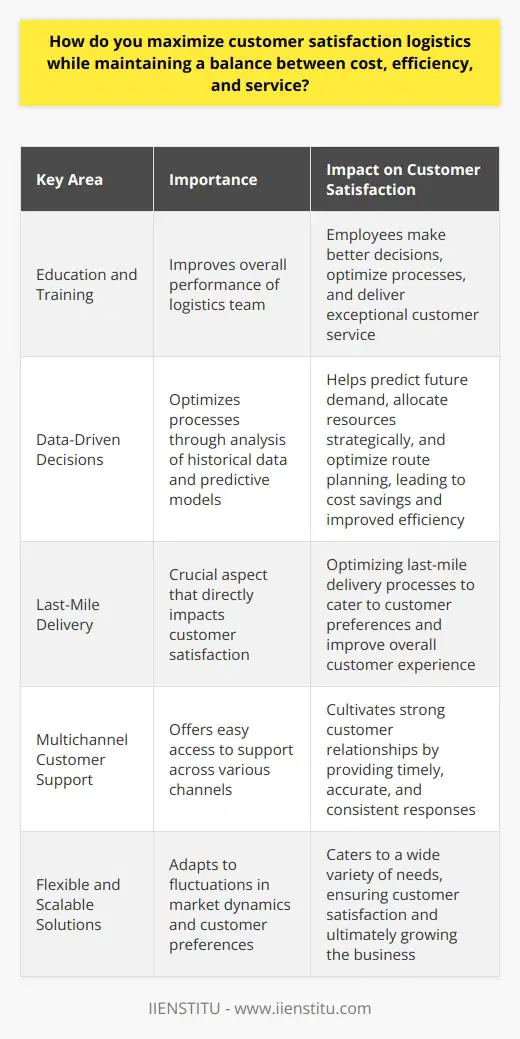
In the era of e-commerce and the need for quick deliveries, how can logistics management evolve to meet customers' increasing demands for speed and convenience without sacrificing customer value?
Meeting Customer Demands
Logistics management is essential for meeting the increasing demands of customers in the e-commerce world. To enhance speed and convenience without sacrificing customer value, several strategies can be employed.
Adopting Advanced Technologies
Utilizing advanced technologies plays a significant role in upgrading logistics management. Artificial intelligence, blockchain, and robotic automation can streamline operations, making deliveries quicker and more efficient. These technologies can also aid in predicting consumer needs and managing inventory levels.
Improving Communication and Collaboration
Better communication and collaboration among logistics service providers, e-commerce platforms, and customers can help in prioritizing speed and convenience. Sharing information in real-time through a centralized system reduces confusion and errors, leading to faster deliveries.
Flexible and Customized Delivery Options
Offering flexible and customized delivery choices can improve customer satisfaction by catering to their preferences. Implementing strategies such as same-day delivery, scheduled deliveries, and pick-up points can make logistics management more adaptable and tailored to individual needs.
Green and Sustainable Practices
Incorporating green and sustainable practices in logistics management can enhance customer value by minimizing environmental impact. This may include using eco-friendly packaging materials, optimizing routes to reduce carbon emissions, and adopting energy-efficient methods in warehouses.
Continuous Monitoring and Feedback
Regular monitoring of logistics processes and gathering customer feedback are crucial for identifying areas of improvement. Continuous evaluation and adjustment help optimize operations, resulting in faster deliveries and satisfied customers.
In conclusion, to evolve logistics management to suit the ever-changing demands of e-commerce, adopting advanced technologies, fostering communication, providing flexible delivery options, implementing sustainable practices, and keeping a constant eye on performance can result in an ideal balance between speed, convenience and customer value.
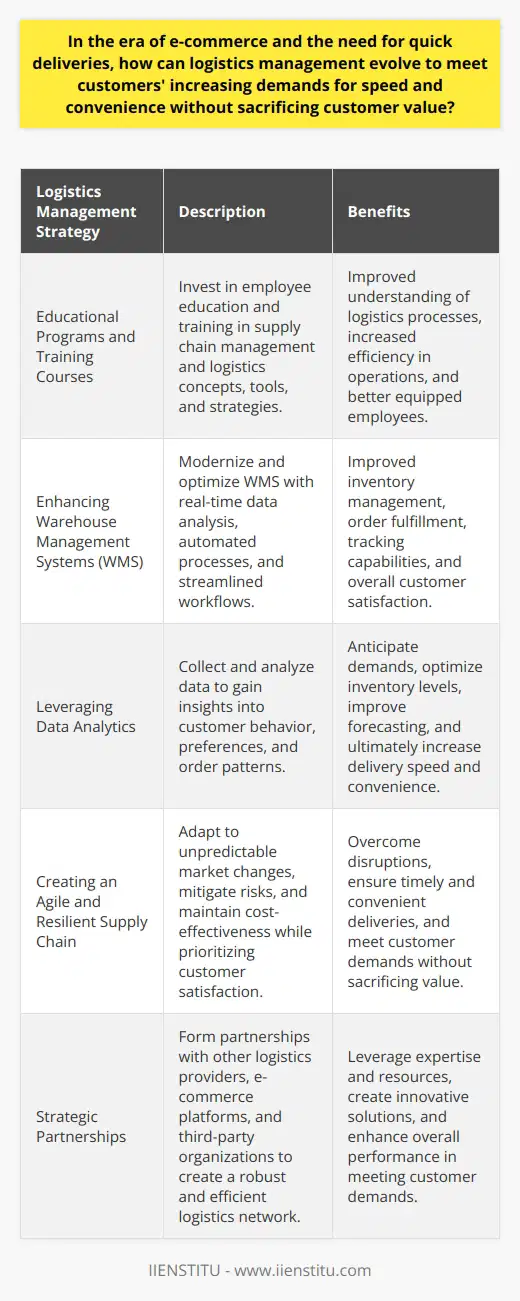
How can advanced data analytics and real-time information sharing between logistics providers and customers contribute to added customer value and improve overall supply chain performance?
Enhancing Customer Value
Advanced data analytics and real-time information sharing can contribute to added customer value by enabling logistics providers to better understand customers' needs and tailor their services accordingly. By analyzing large volumes of data, logistics providers can identify patterns, trends, and preferences, which allows them to improve their service offerings and provide customers with solutions that are better suited to their specific needs. This not only enhances customer satisfaction but can also lead to higher levels of loyalty and retention.
Improving Supply Chain Performance
Moreover, advanced data analytics and real-time information sharing can also help to improve overall supply chain performance by identifying inefficiencies and areas for optimization. These insights enable logistics providers and their customers to work together to streamline processes, reduce lead times, and lower overall costs, which not only benefits the companies involved but also contributes to more efficient and sustainable global supply chains. Ultimately, this improved performance can lead to increased competitiveness for businesses operating within these supply chains.
Strengthening Collaboration
Furthermore, advanced analytics and real-time data sharing facilitate stronger collaboration between logistics providers and their customers. By working together and leveraging data-driven insights, both parties can identify opportunities for improvement and implement strategies to optimize their respective operations. This collaborative approach enables businesses to be more agile and adaptive, responding quickly to market changes and consumer demands, which can result in more effective supply chain management and better overall business performance.
Supporting Decision-Making
In addition, advanced analytics and real-time data sharing can support more informed decision-making by providing businesses with accurate and up-to-date information. Access to accurate data and insights allows companies to make more informed decisions, reduce risk, and capitalize on new opportunities as they arise. Given the complexity and fast-paced nature of modern supply chains, having access to reliable and timely information is crucial for businesses seeking to remain competitive and drive operational excellence.
In conclusion, advanced data analytics and real-time information sharing play a critical role in adding customer value and improving overall supply chain performance. These tools not only enhance the services provided by logistics providers but also foster stronger collaboration, support informed decision-making, and drive improved operational efficiency across the entire supply chain ecosystem. As businesses continue to rely on these technologies, their contribution to more efficient and sustainable supply chains is likely to grow, benefiting both customers and logistics providers alike.
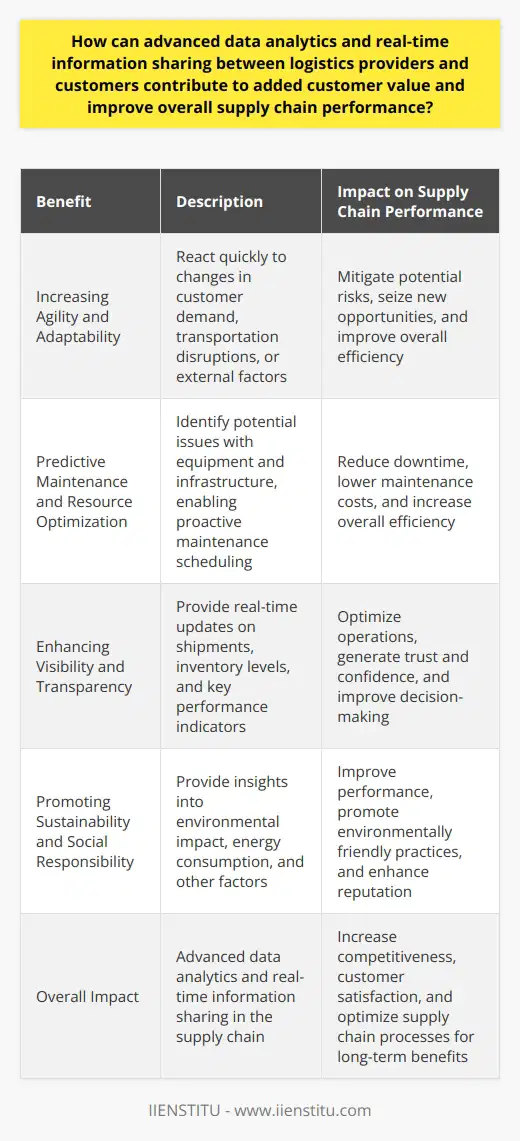
How do you maximize customer satisfaction logistics by effectively managing and adapting to evolving customer expectations and market trends?
Understanding Customer Expectations
To maximize customer satisfaction in logistics, it is critical to understand customer expectations thoroughly. Frequent feedback and a robust customer relationship management system can illuminate these expectations.
Adapting to Market Trends
Staying updated with market trends is equally important. In the logistics industry, trends like sustainable practices, digitization, and same-day delivery are on the rise. Incorporating these trends into operations can help meet evolving customer demands.
Effective Communication
Transparent communication plays a vital role. By sending real-time updates, delays and other issues can be communicated effectively, reducing customer discontent.
Training Staff
Training the staff for effective management of expectations can go a long way. This equips them with the necessary skills to handle customer grievances and queries.
Leveraging Technology
Adoption of technology can streamline the logistics process. Various technologies like GPS tracking, inventory management software, and AI can boost efficiency, enhancing customer satisfaction.
Adopting Flexible Policies
Flexibility in policies can cater to a wider customer base. For example, accommodating last-minute changes in delivery schedules can positively impact customer satisfaction.
Timely Delivery
Ensuring timely delivery resonates with customers. A well-managed supply chain reduces the chances of delayed deliveries, improving overall satisfaction.
Quality of Service
Last but not least, the quality of service offered is paramount. High quality of service directly correlates to high customer satisfaction.
In conclusion, to maximize customer satisfaction in logistics, one must stay in tune with customer expectations and market trends, deliver clear communication, train staff effectively, utilize technology, adopt flexible policies, ensure timely delivery, and maintain a high quality of service.
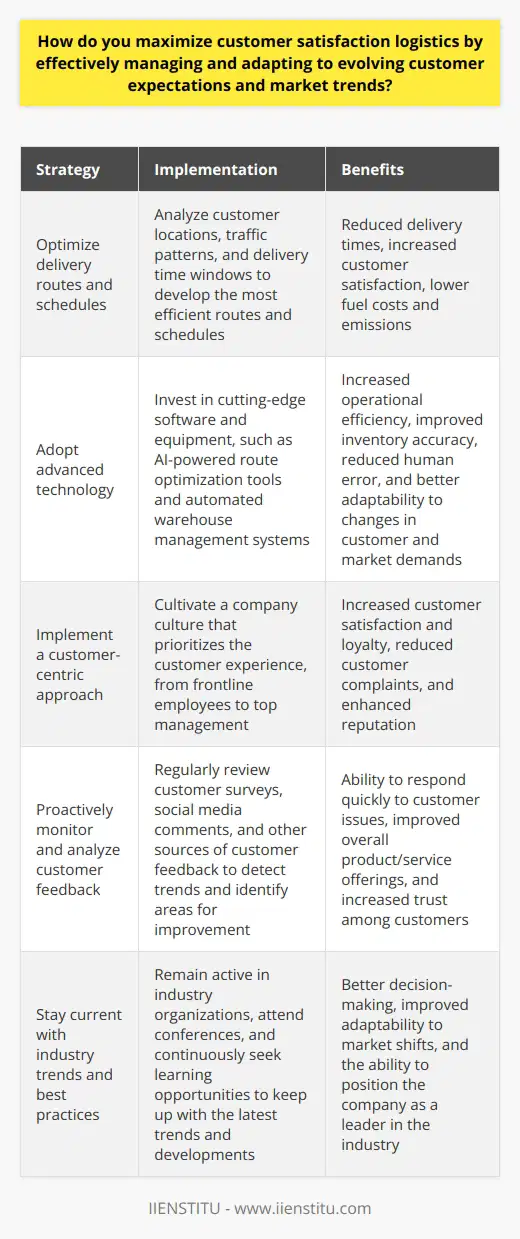
In the context of logistics management, how can organizations develop long-term and sustainable business relationships while ensuring high levels of customer value?
Enhanced Communication
In logistics management, organizations can develop long-lasting and sustainable business relationships by enhancing communication. Clear, consistent, and open communication between all parties involved in the supply chain fosters trust and understanding.
Quality Assurance
Maintaining high standards of quality is another way to ensure sustainable relationships. This includes the product's quality, services, and operations. By consistently delivering services that surpass customer expectations, organizations can create value for the customers. This consequently results in customer loyalty and satisfaction, key factors in establishing and maintaining long-term relationships.
Supply Chain Optimization
Through supply chain optimization, businesses can improve efficiency and reduce costs. The use of technology within logistics management, such as real-time tracking and inventory management systems, allows for greater transparency and operational efficiency. When these savings go to the customer in the form of lower costs or improved services, it enhances customer value and encourages long-term relationships.
Mutual Goals and Objectives
Developing mutual goals and objectives can also lead to sustainable business relationships. Shared objectives ensure both parties work towards a common end, fostering collaboration and mutual growth.
Balancing Cost and Value
Balancing cost and customer value is another vital aspect. Too much focus on reducing cost might result in decreased value for the customer. However, providing high value at significantly high cost is not sustainable in the long term. Therefore, organizations must find a balance to ensure sustainability and high levels of customer value.
In conclusion, enhanced communication, quality assurance, supply chain optimization, mutual goals and objectives, and cost-value balance are key strategies for establishing long-term and sustainable business relationships while ensuring high levels of customer value in logistics management. Proper implementation of these strategies can result in a win-win situation for both the organization and its customers.
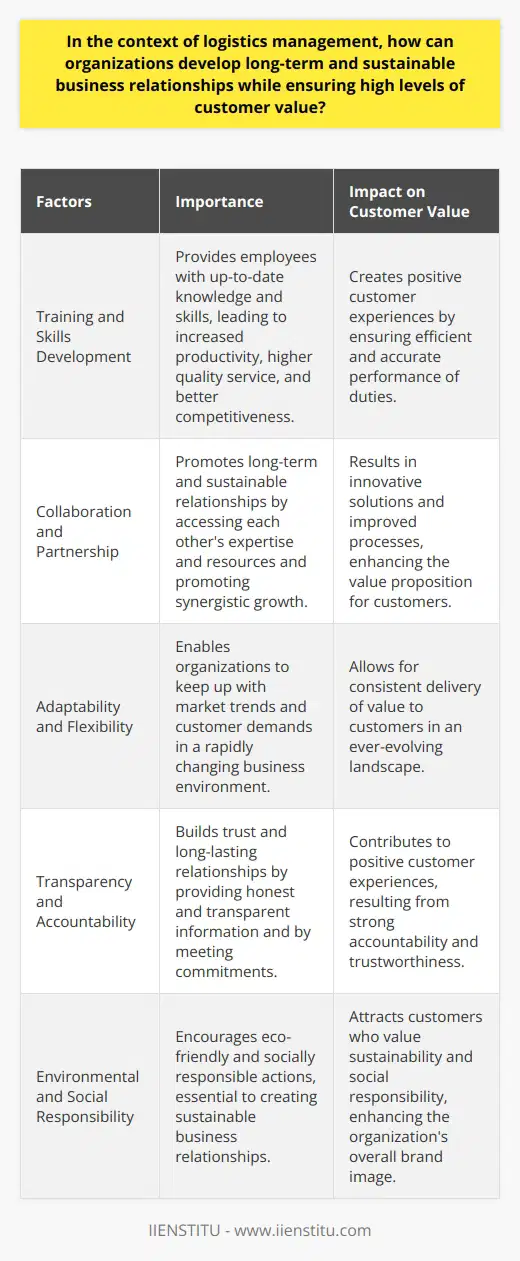
How can advanced data analytics, real-time information sharing, and digital transformation in logistics management contribute to added customer value and optimize overall supply chain performance?
Enhancing Customer Value with Data Analytics
Advanced data analytics provide a deeper understanding of customer buying habits and preferences. They enable companies to anticipate customer needs, tailor services accordingly, and thus add value to the customer experience. Predictive analytics can also forecast demand, facilitating optimal inventory management, and minimizing waste or shortages.
Real-Time Information Sharing for Optimization
The sharing of real-time information is crucial in refining the efficiency of the supply chain. Real-time tracking provides transparency about the status of goods during their transit. This fosters trust between business clients and service providers. Moreover, shared real-time information can predict and alleviate possible bottlenecks, improving the overall pace of the supply chain.
Digital Transformation for Effective Management
Digital transformation within logistics management streamlines processes, thus increasing productivity while reducing overhead costs. The automation of manual tasks reduces the potential for human error while speeding up processes. Furthermore, advanced software allows for comprehensive overview and control of supply chain operations. This results in an optimized workflow, reduced delivery times, and ultimately a more satisfied customer base.
In conclusion, these technological advancements have revolutionized logistics management. They've enabled the creation of data-driven, real-time, and digitally transformed supply chains that deliver unparalleled customer value while optimizing performance. Embracing these technologies is thus a strategic move for businesses aiming to stay competitive and customer-oriented in today’s market.
